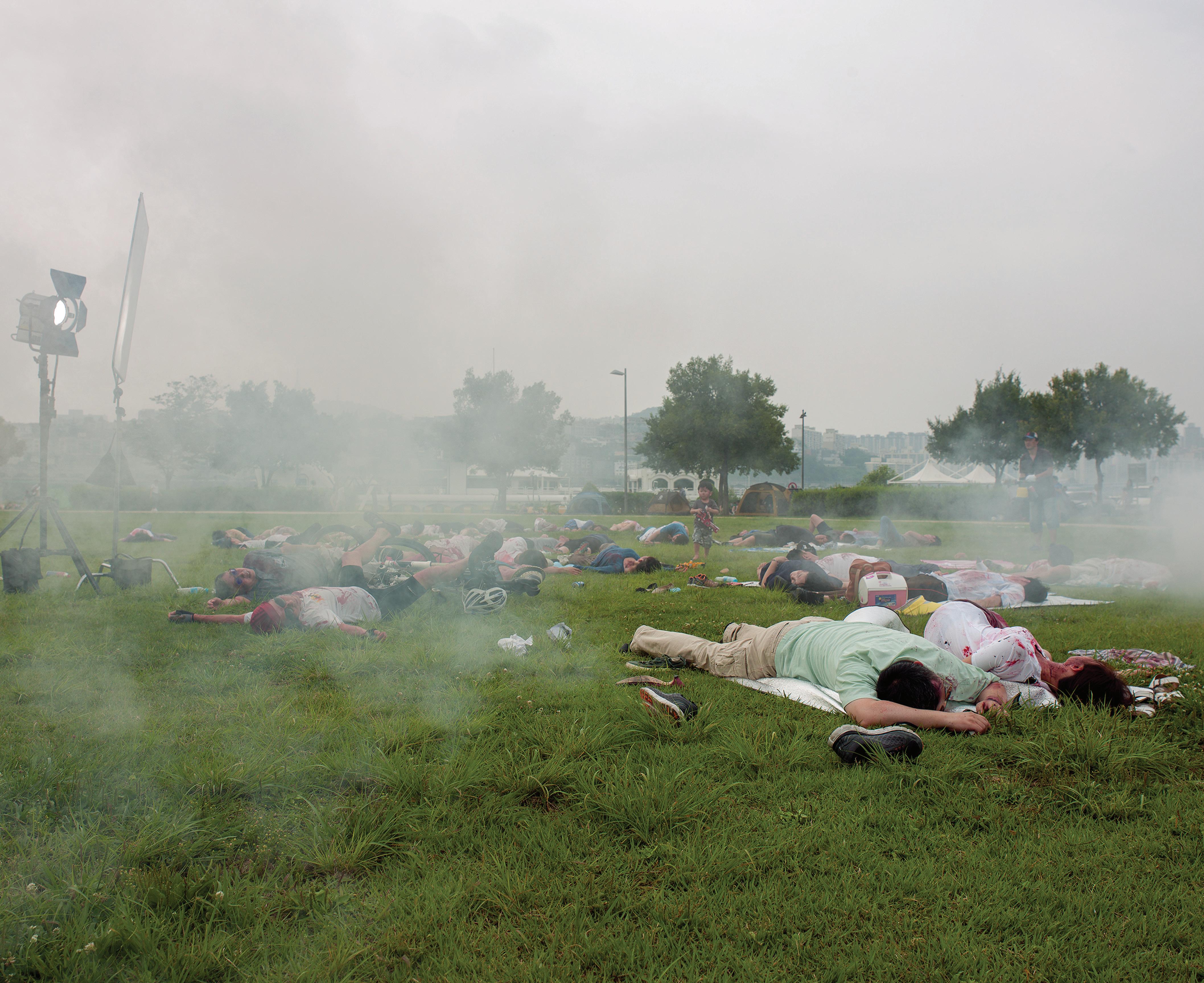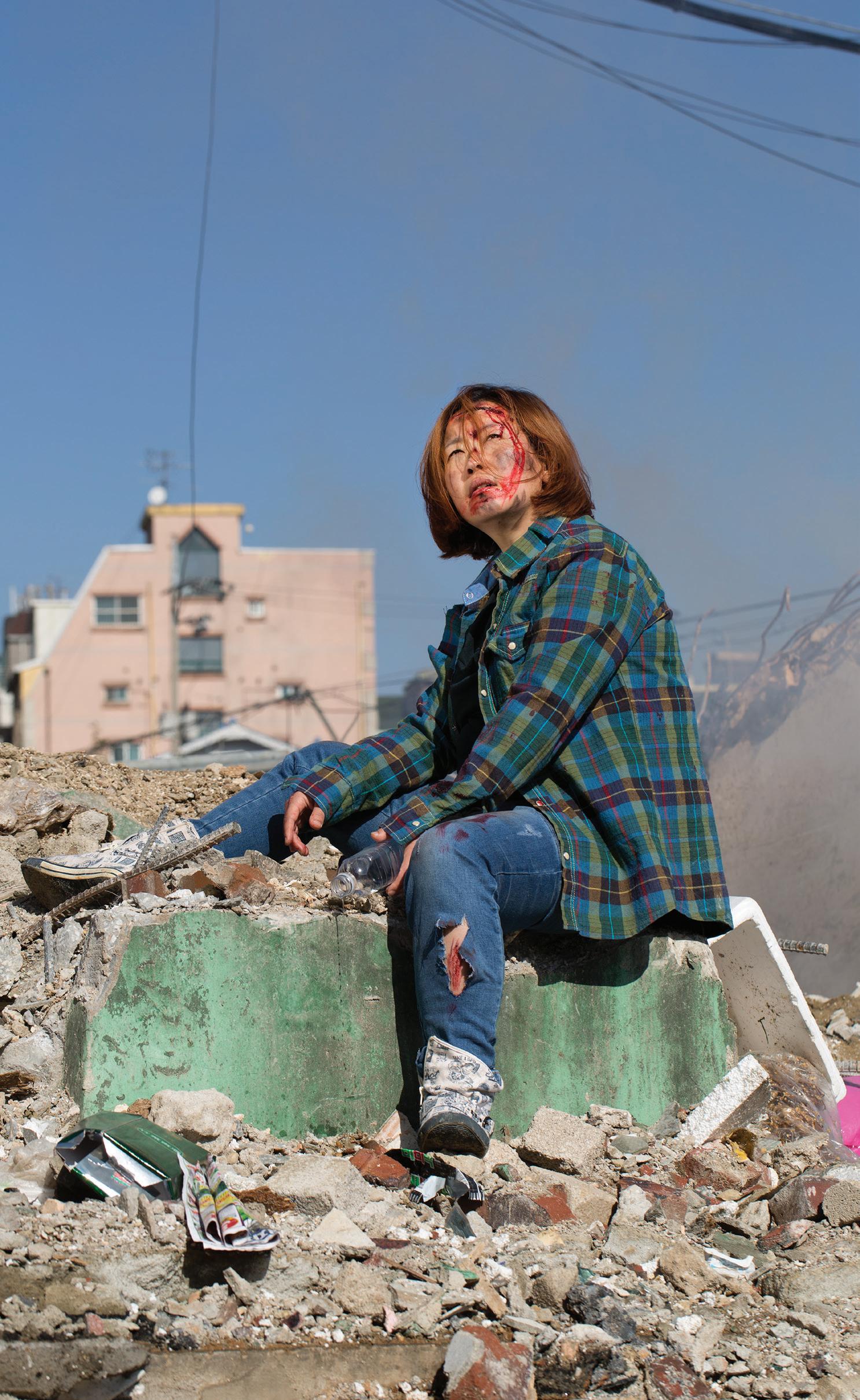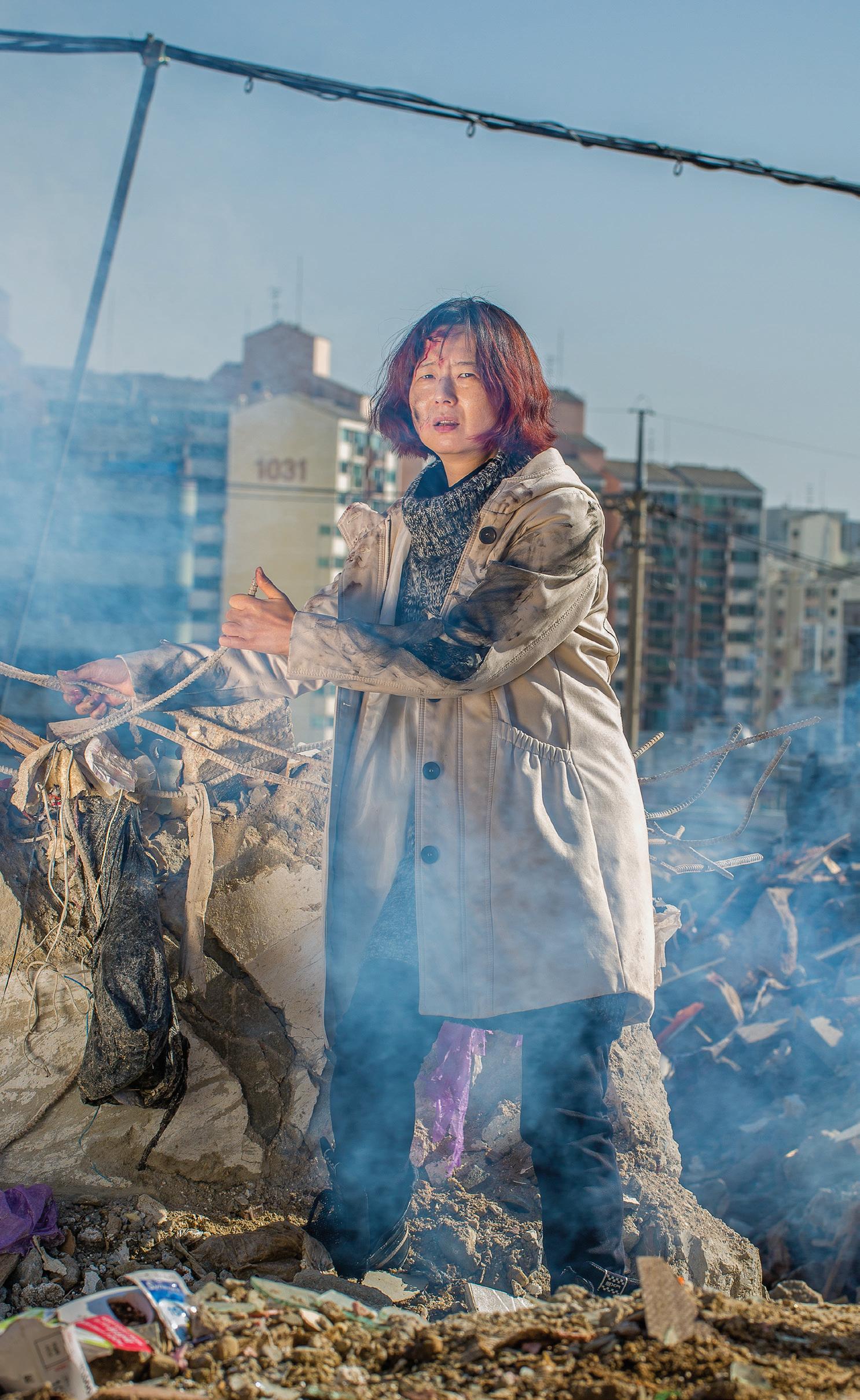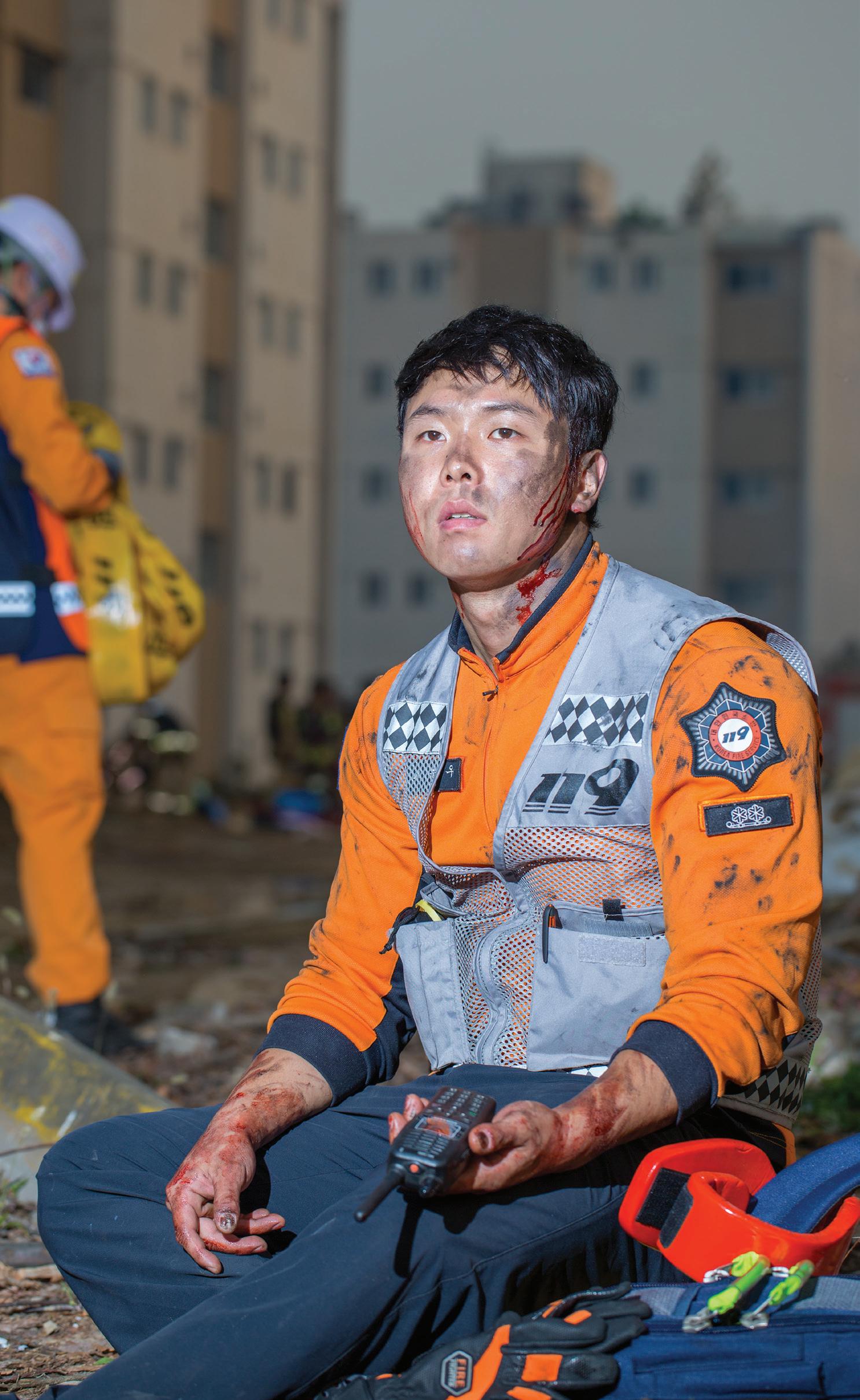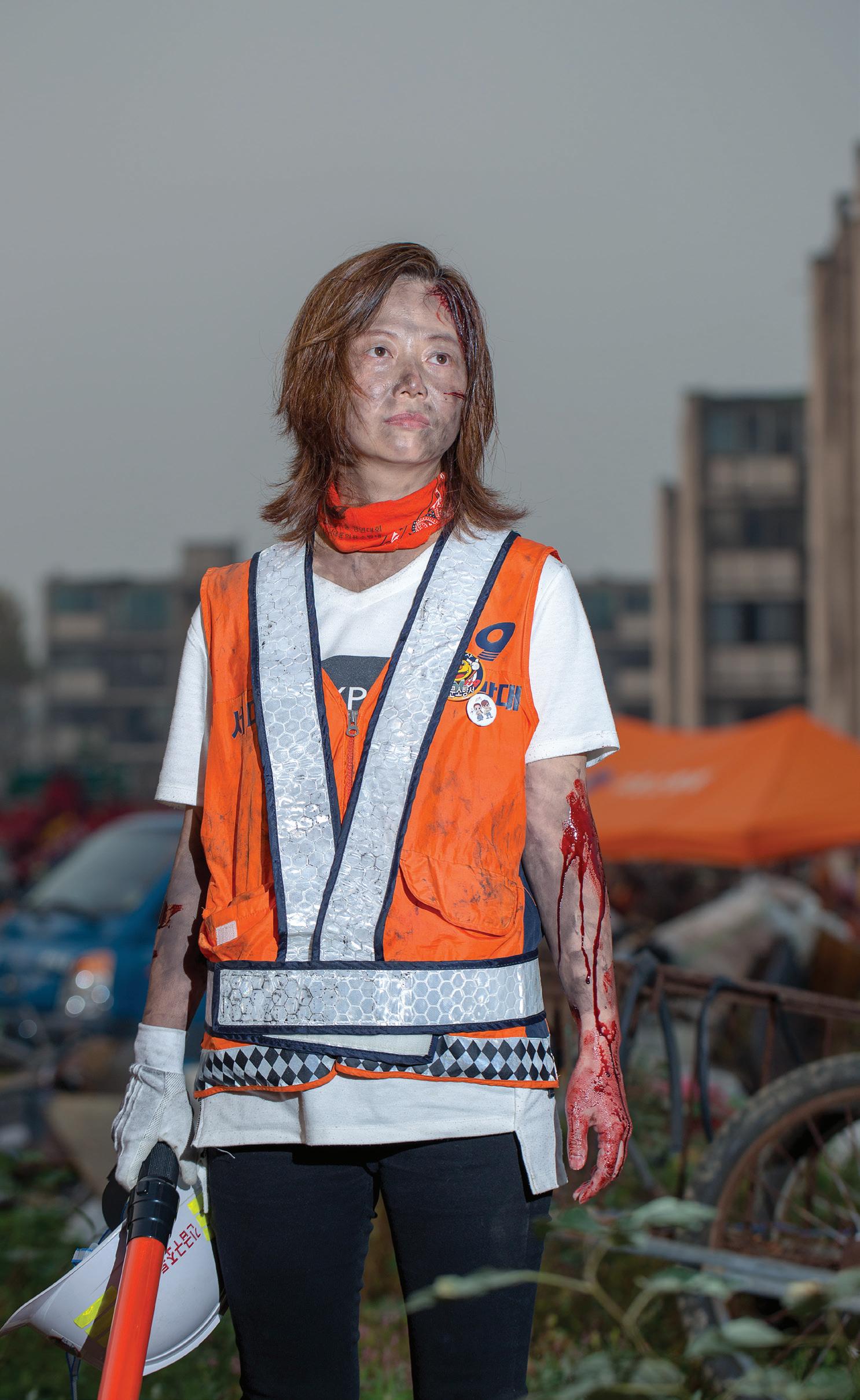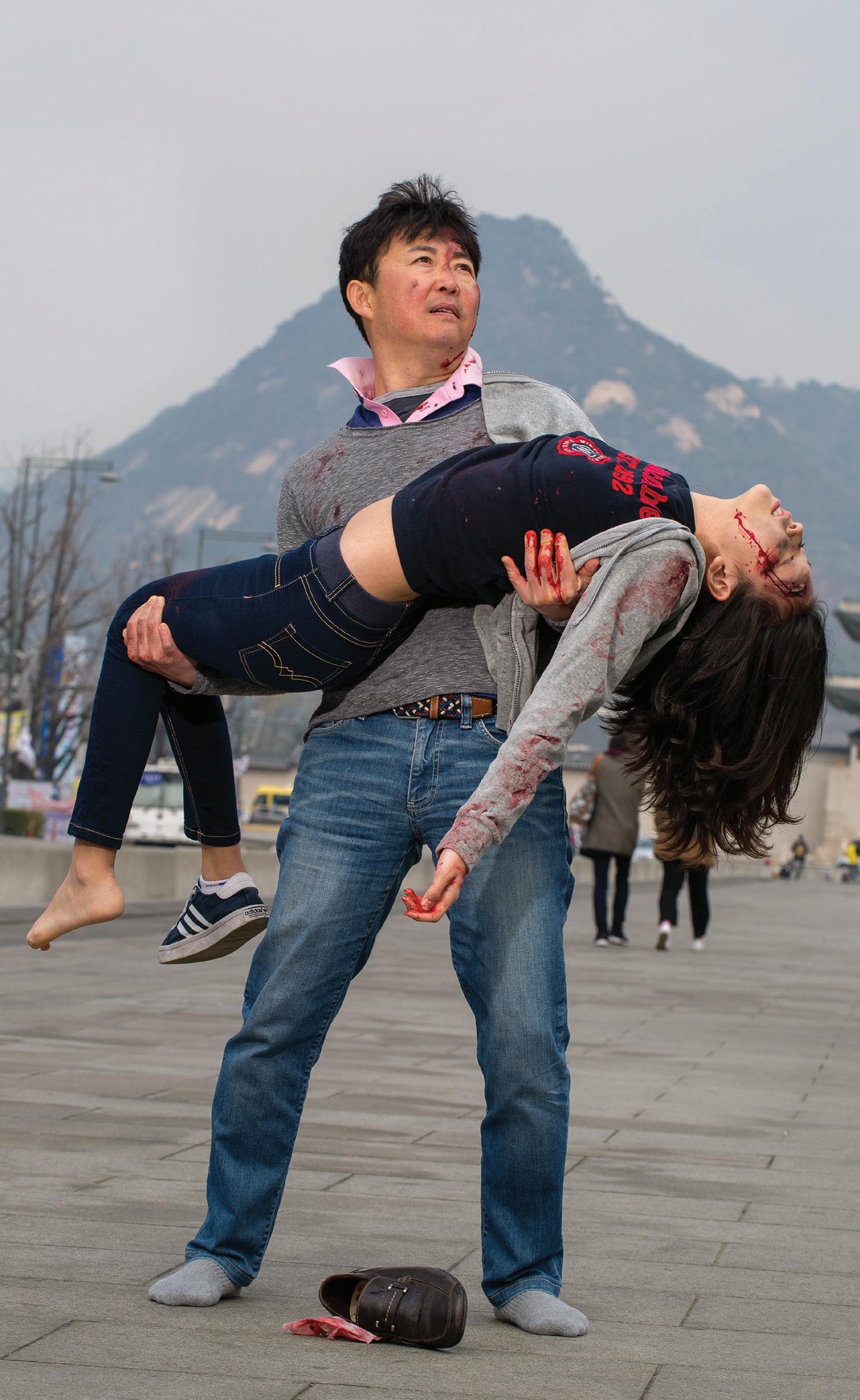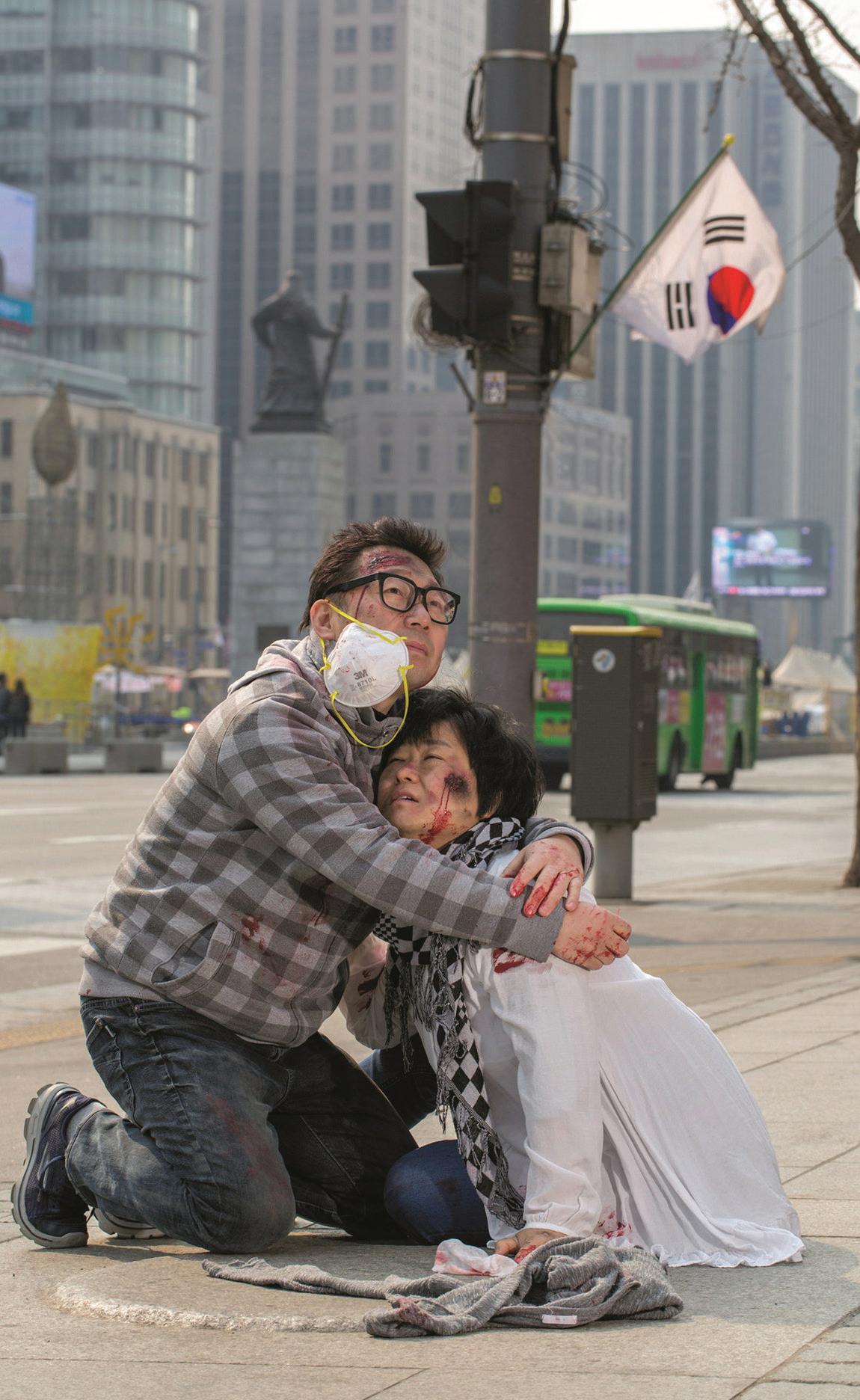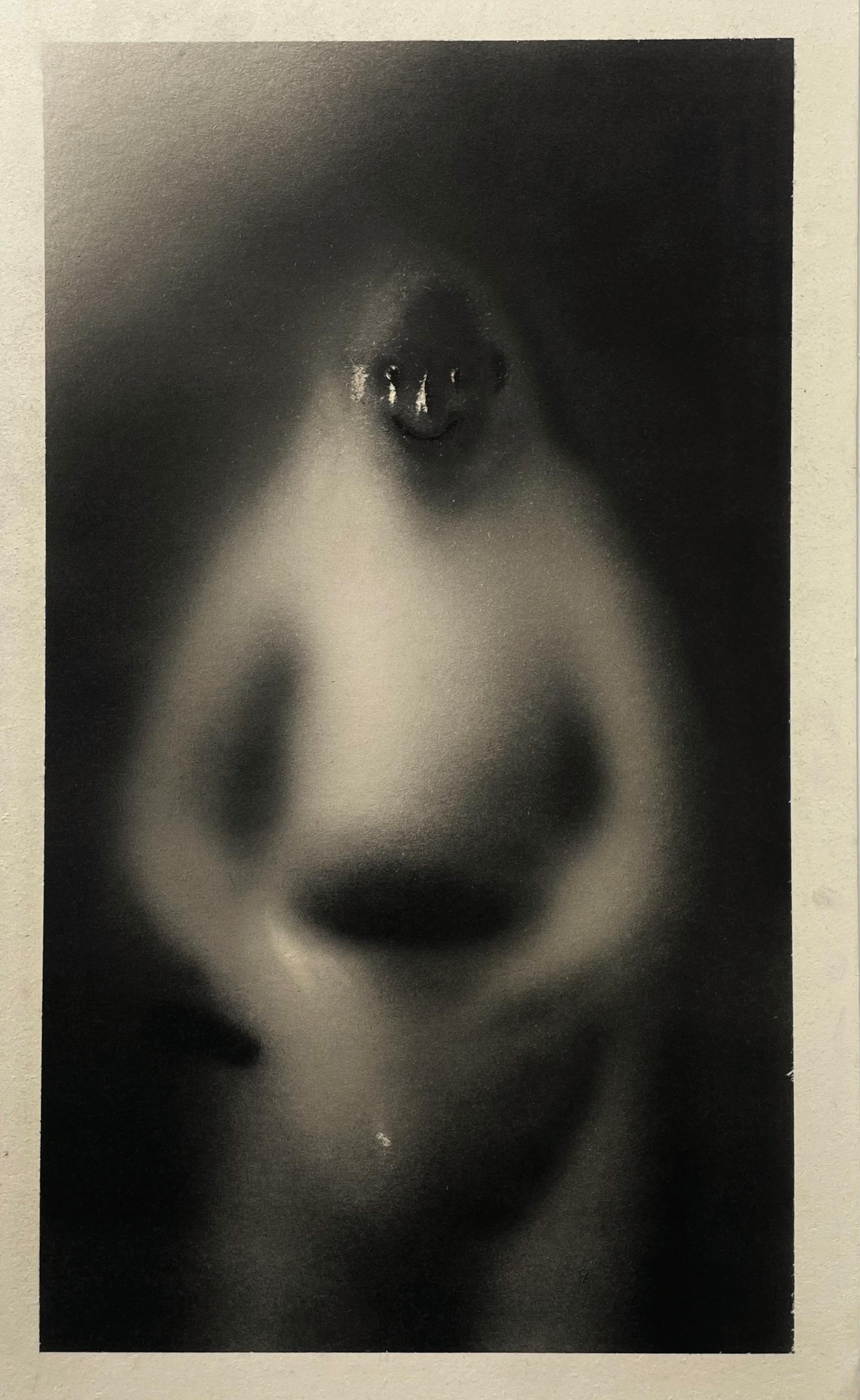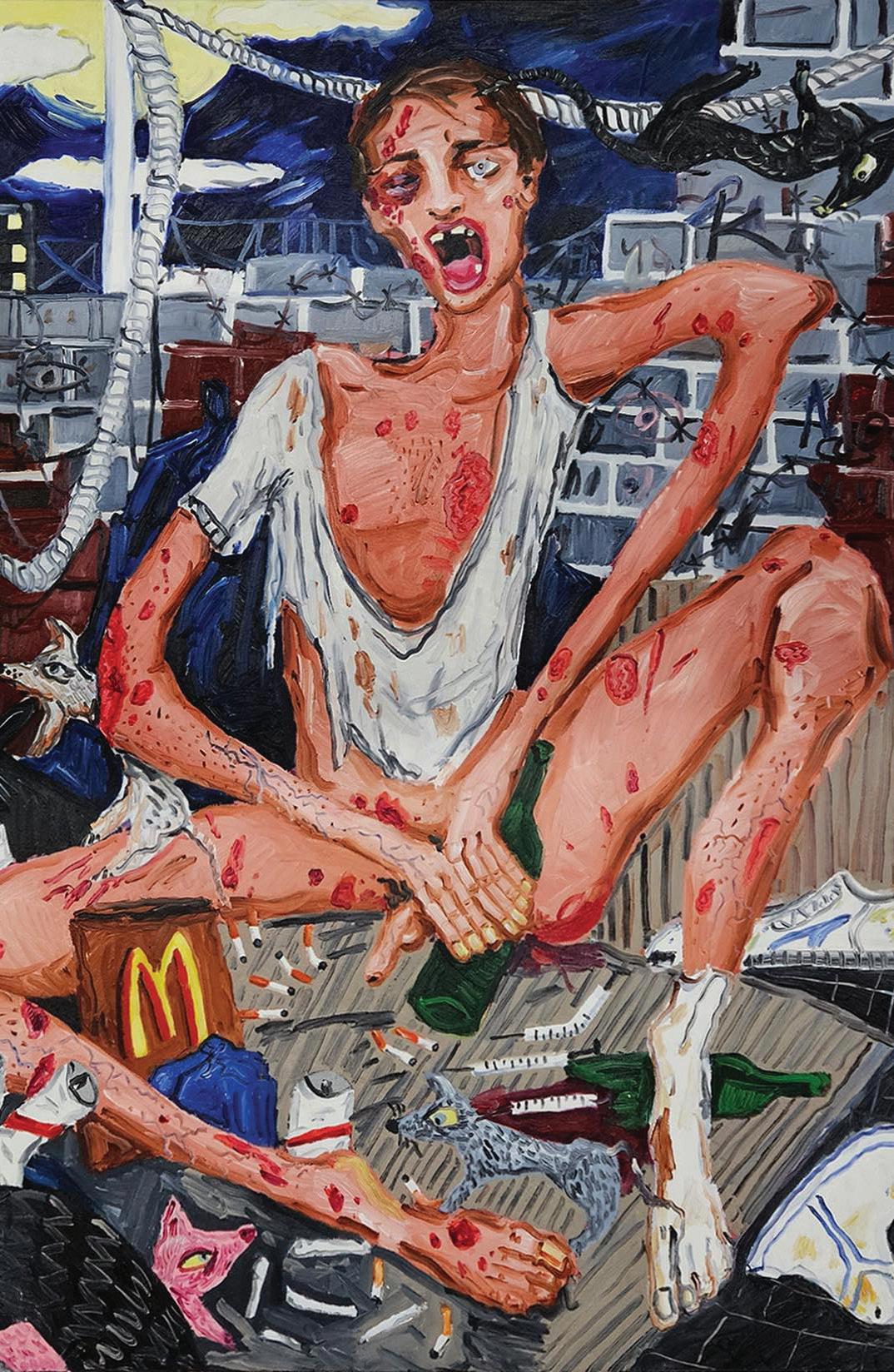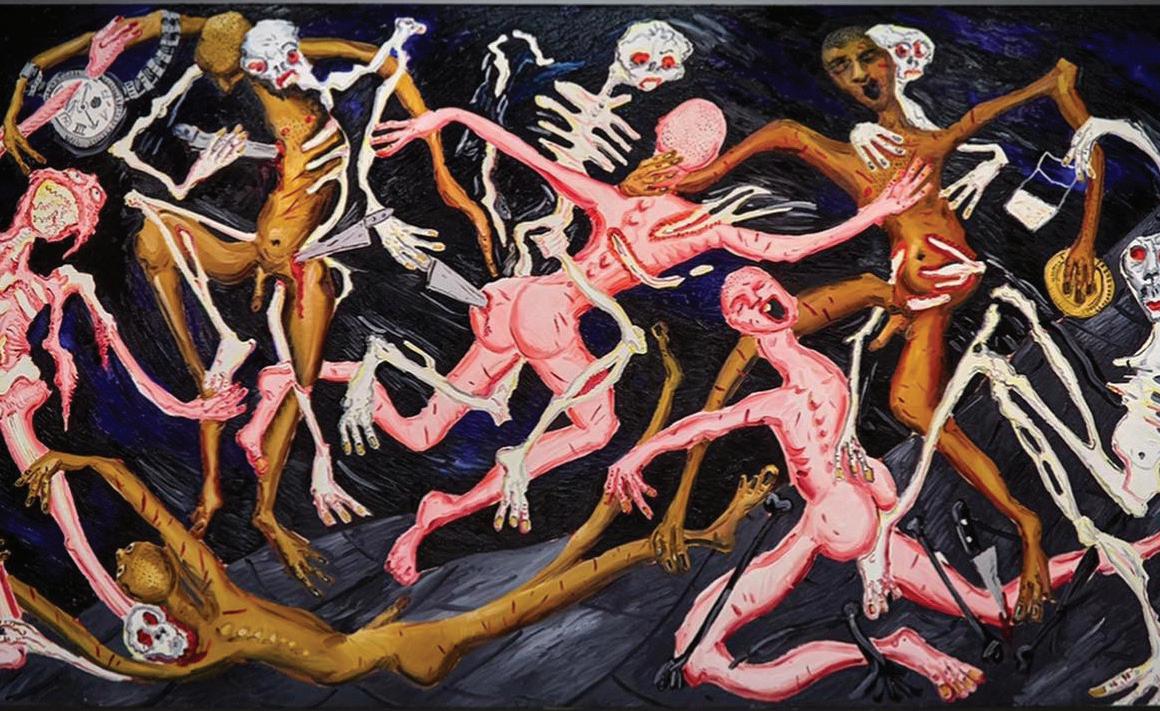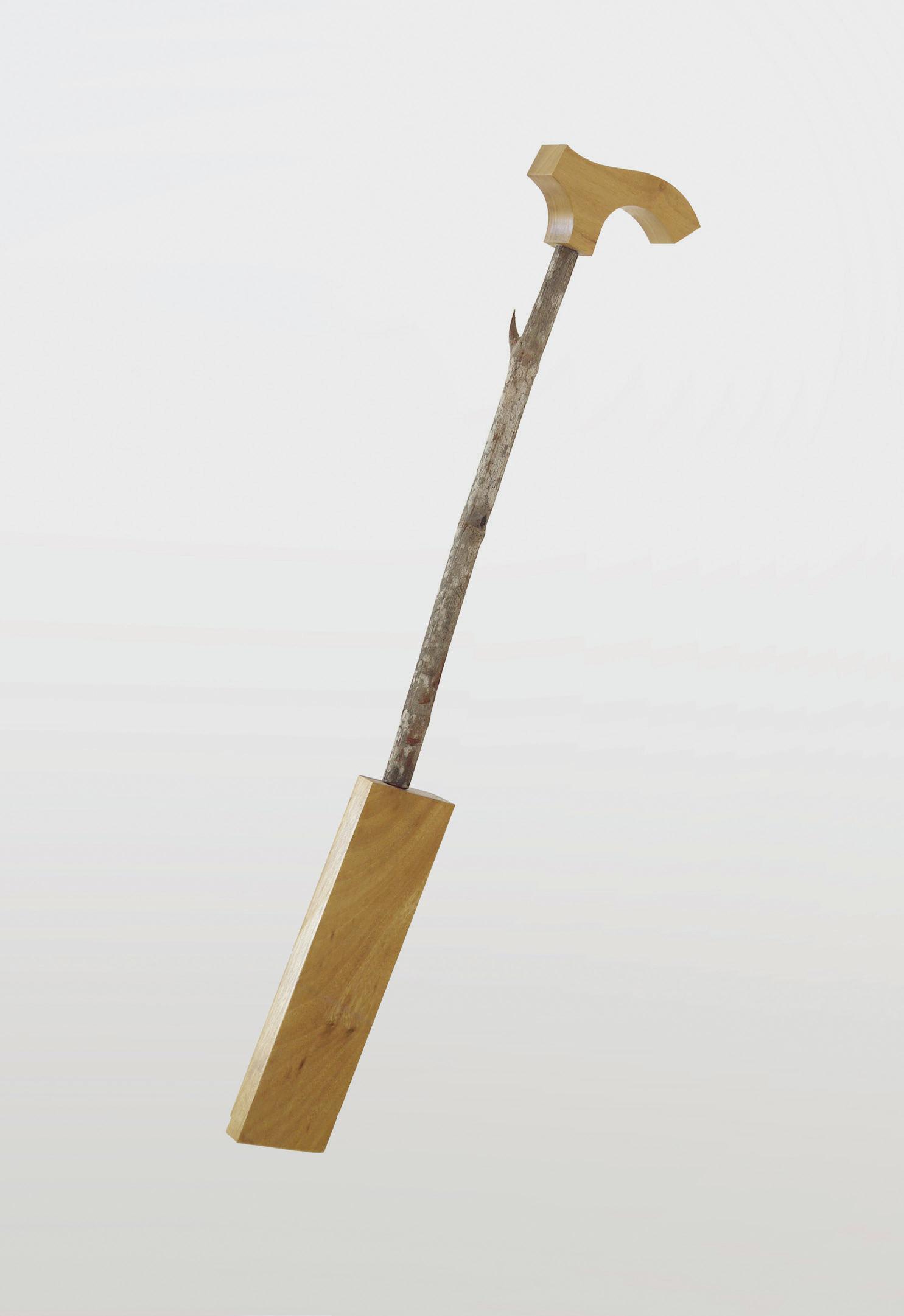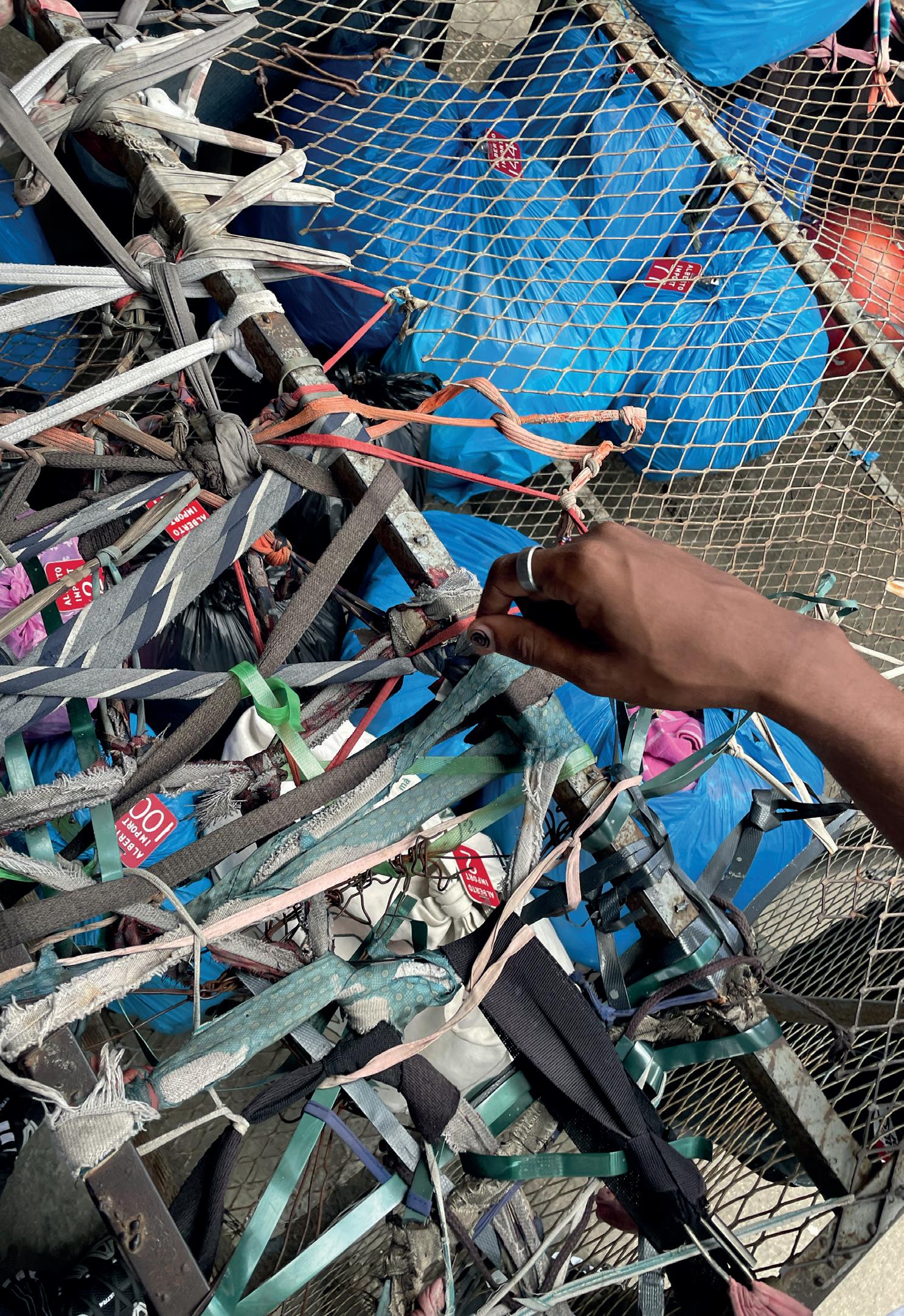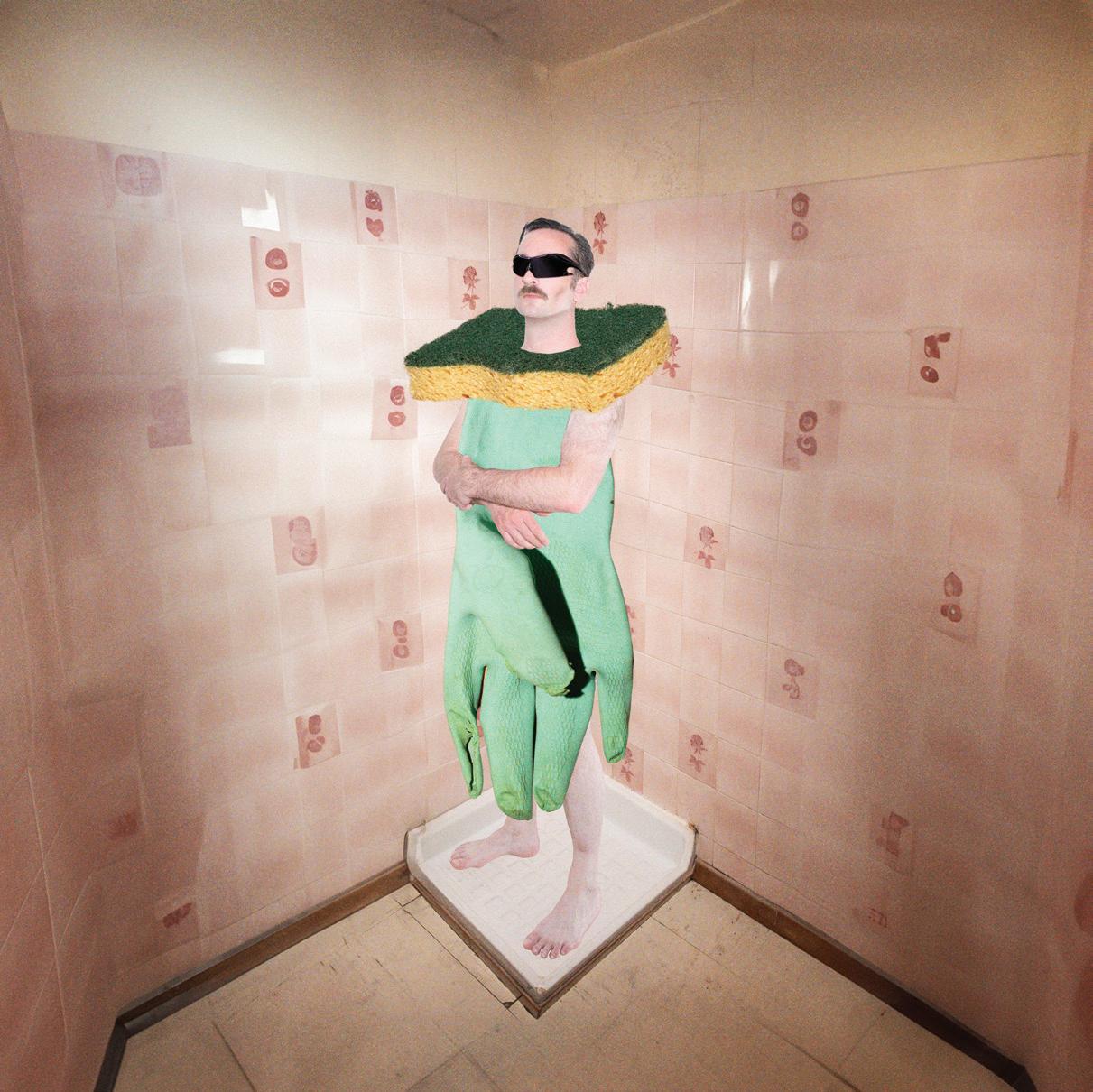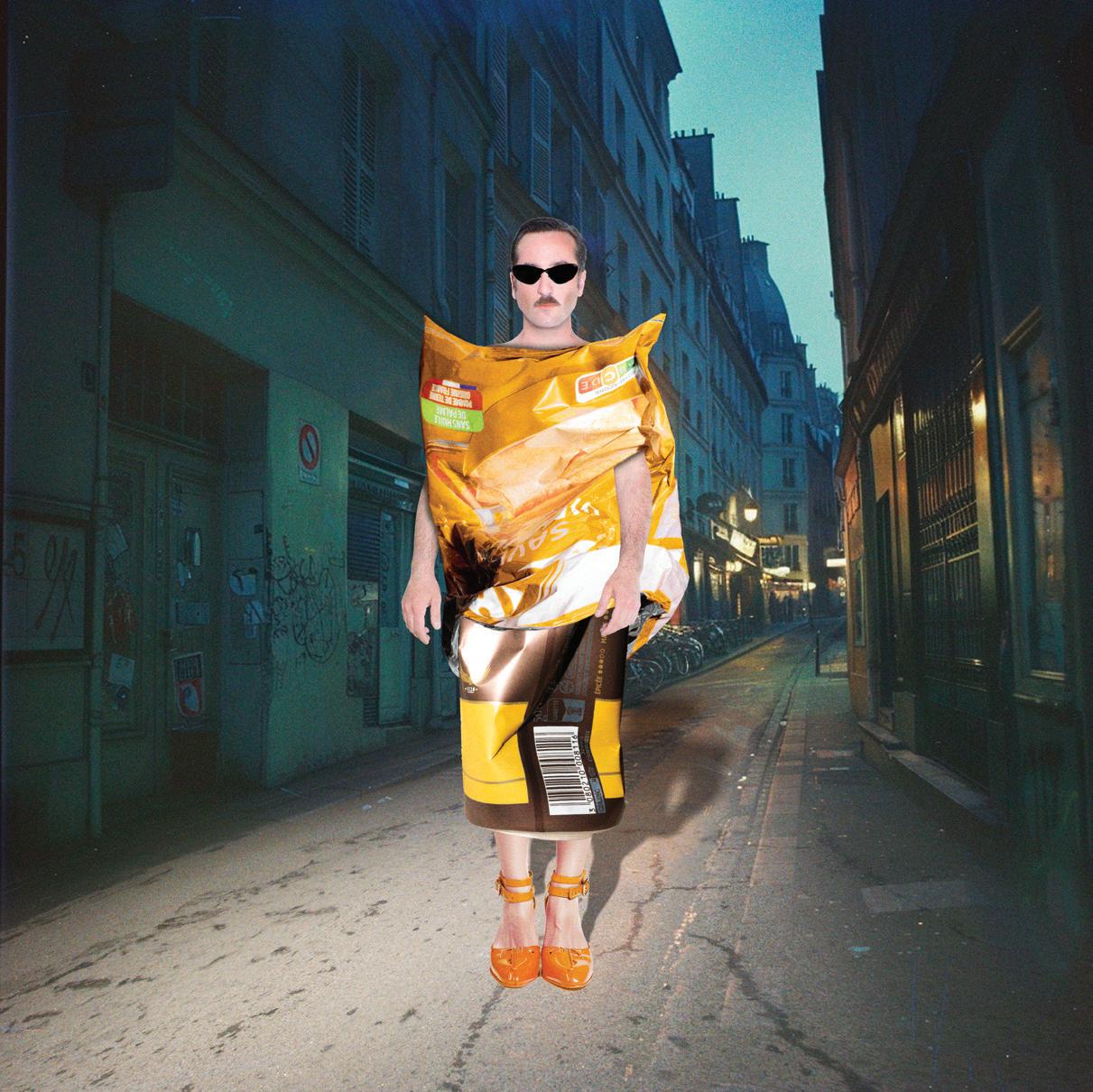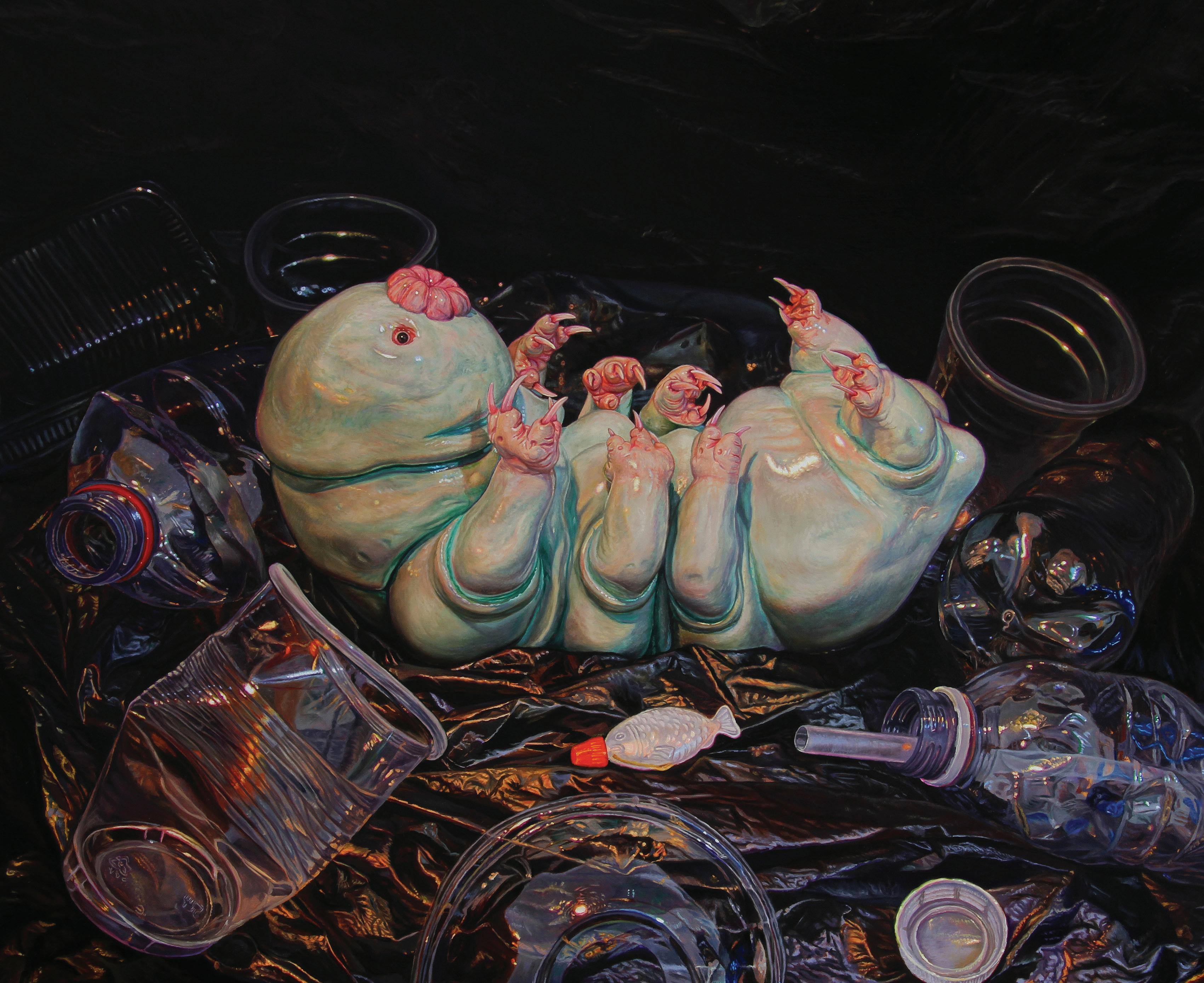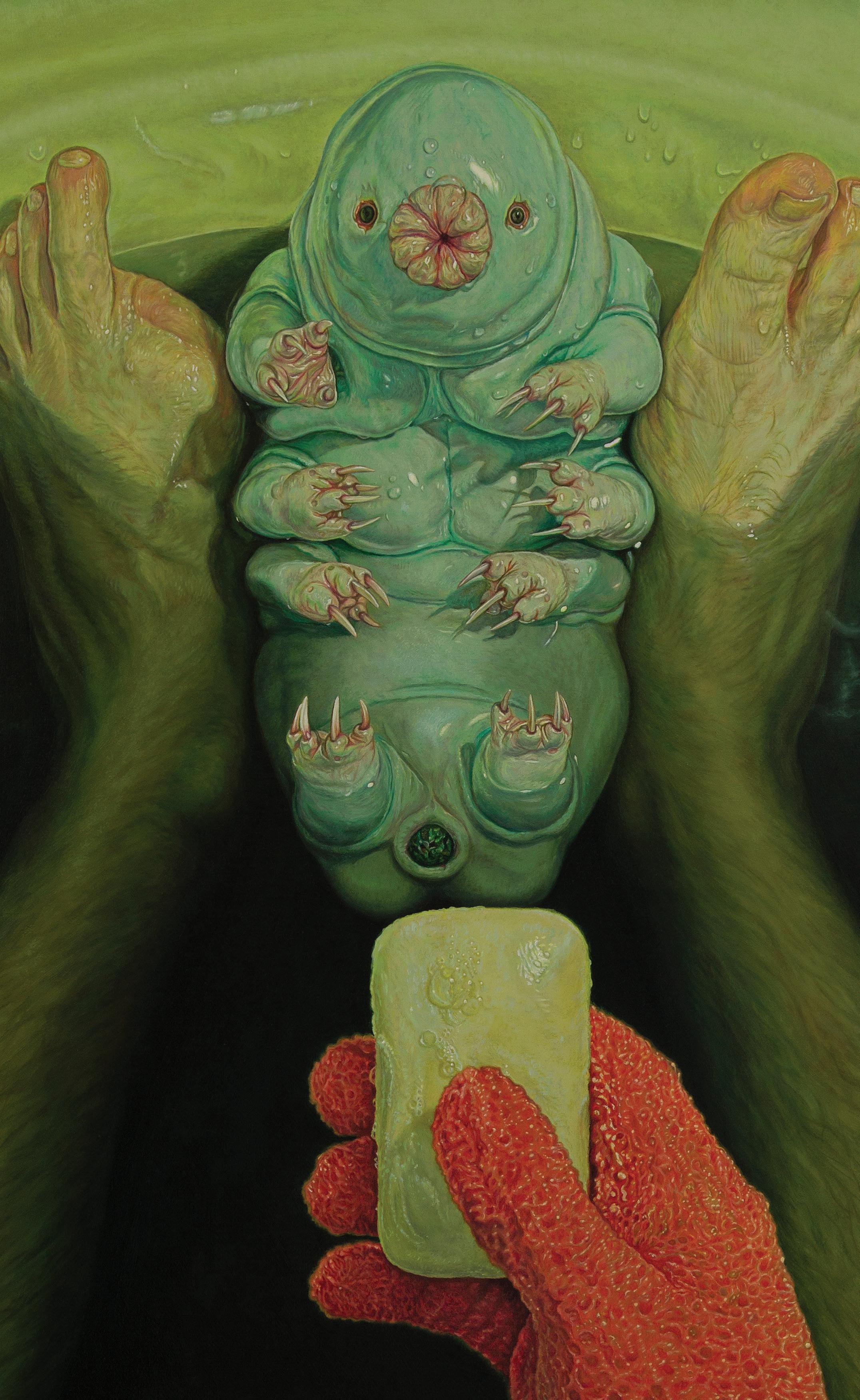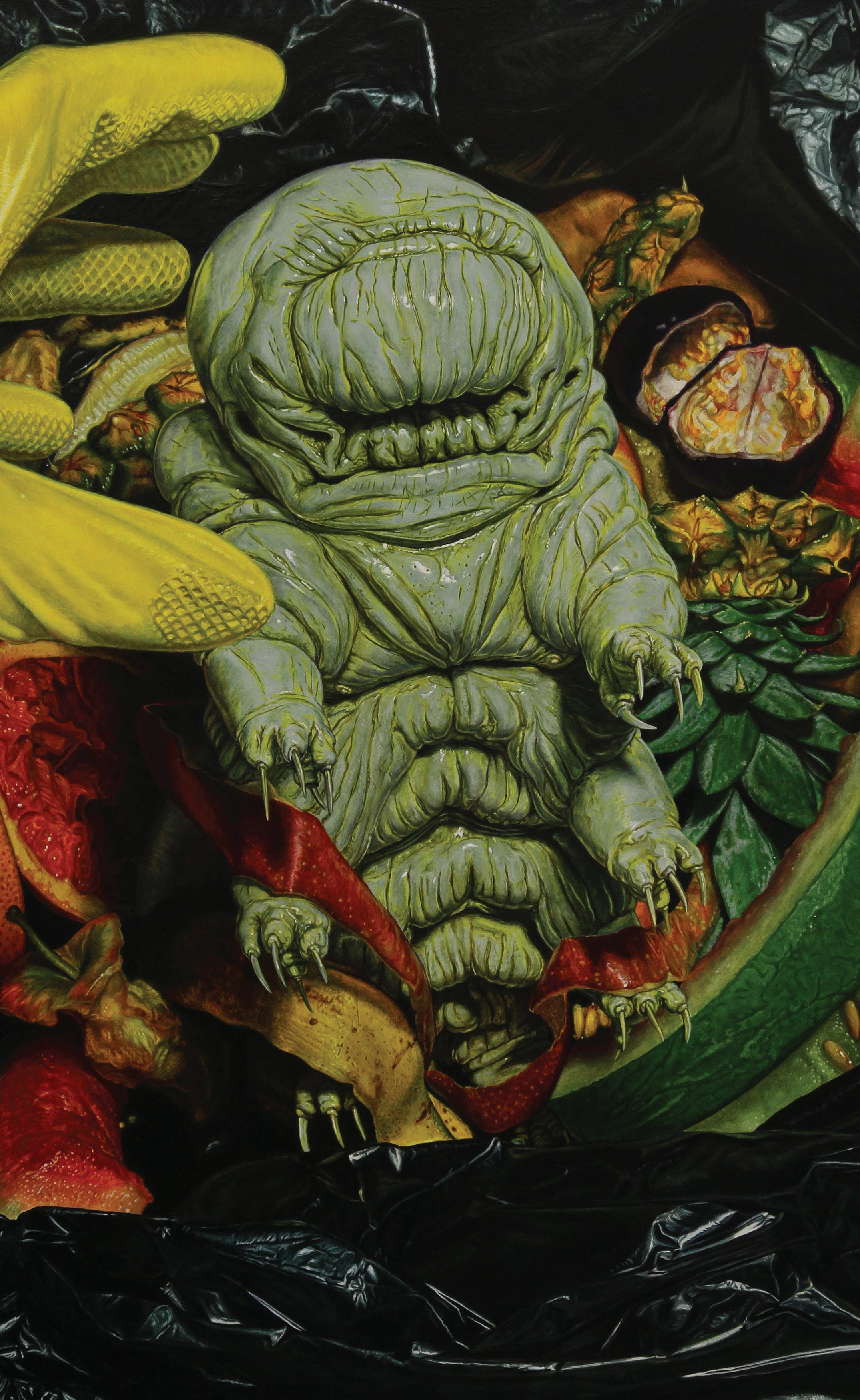

This is the end
Beautiful friend
This is the end
My only friend, the end
Of our elaborate plans, the end
Of everything that stands, the end
No safety or surprise, the end
I’ll never look into your eyes ... again
Can you picture what will be So limitless and free
Desperately in need ... of some ... stranger’s hand
In a ... desperate land
Lost in a romance ... wilderness of pain
And all the children are insane
All the children are insane
Waiting for the summer rain, yeah

4 Everything is alive
Ian Chillag
18 Apocalypse Dos and Don’ts
Sean Cole
36 Dante and the Lobster
Samuel Beckett
50 Total Eclipse
Jovana Reisinger
58 Golden Girls
Danijela Pilić
66 Rehearsal of Anxiety
Anna Lim
80 The Bucket Rider
Franz Kafka
84 The End Is Near Lili Ruge
90 Hell
Gerhard Polt
96 POORDESIGN
EFE
104 The Catwalk to Doomsday
Julia Werner
116 Billionaire Bunkers
Douglas Rushkoff
122 La Cucaracha
Christian Gottwalt
I Let’s just start, settle in, have you introduce yourself for us.
L My name is Louis and I am a can of Go2 Cola.
I That’s a store brand?
L Mm-hmm. Go2. G-o-2 Cola.
I So it’s similar to Coca-Cola?
L Similar. People call it a knock-off. I’ve been called the best of the worst. You know, if you wanted to get my honest opinion I believe in a blind taste test. Your average person wouldn’t be able to tell the difference between me and a can of regular Coca-Cola, but yeah, bottom shelf. We can describe it comfortably as bottom shelf. I’m at peace with that.
I Literally on the?
L Most of the time, yeah.
I Well, there’s a lot I wanna talk to you about today. Do you need water or anything?
L No, no. I’m completely self-contained.
I I wanna ask you about your time before you ended up in the fridge you’re in now. So, you I take it were, you were in a supermarket?
L Yeah.
I And, where were you?
L I was in a Safeway. I was bought at a case. So there were 24 of us. We were all purchased together and actually our next residence was a bowling alley for a 12-year-old’s birthday party. I saw most of the rest of my case drunk at that party. I was not drunk, I was saved for later and was brought home and put into a refrigerator and forgotten about for a few months placed in the back of the fridge. I
L I froze in the fridge. I was in the very back and the temperature got very cold. I didn’t freeze all the way through, but I had a frozen couple of weeks. Pretty chilling.
I You were slushy inside?
L I was slushy inside, yeah. And I had a brief adventure when they realised I was still in the fridge and they took me out for a road trip. I got to sit in the front seat cup holder, you know, and I took a little fun road trip down to Florida and then back again. And they never got around to drinking me on that trip, and they put me back in the fridge, and that’s where I’ve been ever since.
I It sounds like you were almost chosen so many times?
L Yeah, yeah.
I What does it feel like when you’re say, at this birthday party, and you’re waiting for your moment?
L (SIGHS) Have you ever seen the movie »Jaws«?
I Yeah.
L So you know the story that Robert Shaw tells to Roy Scheider and the other guy? Anyway, you know the story about the USS Indianapolis? Where he’s in the water and the sharks are coming, and he’s waiting to be ticked off, and he’s waiting, and having that long dark night, and one by one he’s seeing his friends go. That’s kind of what it was like for me. It was terrifying. And on the one hand, I was very angry at human beings for being in this position to consume us. And then on the other hand I was also very angry, how come you didn’t wanna consume me?
I Mm-hmm, yeah. When you think about being consumed by a human, do you think about the human that you wanna be in?
L (LAUGHS) If and when I’m finally consumed, I hope I’m consumed by someone who enjoys it. (HAUNTING MUSIC) But I like to imagine that if you’re drunk immediately, that instead of being a pain-
ful process, there’s this sort of first moment of relief. The can is cracked open. All of this internal fizzing that I have going on finally has somewhere to go. Just sort of drowned out from your external can, and you have that last moment where you’re fulfilling your purpose, and beginning to blend in with this human being, and you become part of their story. (HAUNTING MUSIC) Truthfully, here’s how I expect to go, assuming I am consumed. I’m expecting it’s gonna happen in the middle of the night when I’m not waiting for it, and someone’s gonna open the fridge, and pull me out, and that’ll be that. It would be nice to be poured into a nice big pint glass, you know. A frosty mug would be a pretty good way to go. That would be pleasant, you know. I doubt that’s gonna happen though. They don’t reserve frosty mugs for Go2 Colas. It’s just another one of those facts of life. (MUSIC FADES)
I How did you see »Jaws«?
L Oh, the human being who lives in my house was watching »Jaws«. They took me out of the fridge, and kept me on the table, and I thought, »This is it, this is my big moment.« Kind of part of me there was the Robert Shaw scene where he’s telling the story of the Indianapolis, and I was thinking, »Boy this is just too perfect, this would be amazing.« And he was reaching for me, he was gonna go for me, and then at the last minute, you know, another human being came into the house, and scolded him on not drinking soft drinks, so he put me back in the fridge.
I Wow.
L Yeah. That would’ve been perfect, huh?
I Mmm. You know, I should ask you, there’s a lot of talk right now about the health effects of soft drinks. People tend to think of them as very unhealthy. Just wondering, do you feel unhealthy?
L Do I feel unhealthy? It’s hard to say because I think if you were feeling the way I feel, you would feel unhealthy.
I Right.
L But I feel like me. I can’t say that that means I feel good, but to go back to your question, unhealthy drinks are not like a new thing by any means. Have you ever heard of Radithor?
I Radithor?
L Radithor. All right, so back in the ’20’s there was an energy drink with radium called Radithor, OK? And the idea was it was just radioactive material in water. They claimed Radithor gave you energy and cured a bunch of things. They also implied that Radithor increased male virility. Radithor also killed, you know, people.
I So people would just, uh drink radioactive material dissolved in water?
L Mm-hmm.
I I’m just looking it up here. There’s actually … there’s an Ebay ad, there’s a bottle of Radithor for sale.
L Oh, come on now.
I It’s currently $659.
L You’ve gotta be kidding me.
I It says here, »This certified radioactive water was advertised as a quote, ›Cure for the living dead,‹ and quote, ›perpetual sunshine.‹«
L Mm-hmm.
I It goes on. One guy who used it, Eben Byers, died from radiation poisoning, and they had to bury him in a lead-lined coffin.
L Yeah, that’s what you get when you drink radioactive material.
I So they made a beverage which not only killed a man, but his dead body would have, had they not taken precautions, killed all life around him.
L Yes. Presumably, his dead body is still radiating the poisons that he drank from Radithor.
I In fact, the ad goes on. (CHUCKLES) They exhumed him for study in 1965 ...
L Oh, come on.
I ... and his remains were still quite radioactive.
L Yeah.
I It then mentions the developer of Radithor was not an actual medical doctor.
L Yeah, that sounds about right to me, too.
I Also, the bottle’s in very good condition.
L So, there’s your original power drink for you. That says to me more about human beings than it does about soft drinks to be perfectly honest.
I Our willingness, our eagerness to find something to ...
L Your chronic search for potency.
I Yeah.
L That’s my evaluation of humanity. A chronic search for potency.
I Louis, one quick thing I wanna ask you about? I have in my life occasionally dropped a can of soda.
L Oh yeah.
I Has that ever happened to you?
L Oh, it’s an awful experience. You feel I mean obviously, very shaken. There’s a rush I guess of in human being terms, it would be like a rush of adrenalin, and for a while you’re feeling just very hyper after the shake-up. And then you start to sort of resettle back to a neutral state, but you have this awful kind of nauseous, sicky, sleepy feeling after the fact. And you feel kind of dumb, you know. The shake-up kind of like rattles you a little bit and takes a little bit of time for your intelligence to kind of come back to you. It’s an awful experience.
I I imagine too like we often after that happens, we will tap on what would be your head.
L Don’t. It doesn’t do anything.
I It doesn’t?
L Don’t. There’s no reason to do it. It doesn’t do anything to the carbonation. All it does is annoy us in a very sensitive moment. Yeah, don’t do that. (INSTRUMENTAL MUSIC)
I So, Louis, this might be awkward to talk about, but I feel like there’s a hierarchy to sodas. At least in terms of how humans think about them.
L Sure.
I At the top, there’s you know Coke and Pepsi, and then there’s 7Up and Sprite. And then there’s these, you know, like your Sunkist and Grape soda, Fanta that are kind of at the bottom. I wonder if that ... does that hierarchy, does it mean the same thing to you?
L Well, let me tell you something about Fanta. I mean sure, here in the US it’s not the most sophisticated soft drink, but overseas it’s huge. Like Japan, huge.
I Fanta?
L Fanta. In Thailand it’s all over the place. If you walk down the street there, you’ll see half open bottles of Fanta everywhere. Strawberry Fanta in particular, everywhere just hanging out.
I Just like sitting on the street?
L Yeah, just on the street because humans there use Strawberry Fanta as an offering to ghosts.
I So they leave it out on the street because they’re giving it to ghosts?
L Yes. Friendly ghosts, according to local custom, love sweet red soda. So if you leave it out, it attracts them, and they hang out around your house, and protect you from, you know, I guess what-
ever unfriendly ghosts might come around. Who I guess don’t love sweet red soda.
I Right. Do you know what it is about Strawberry Fanta in particular?
L Because of the colour. So there’s a theory that it’s because they can’t do blood offerings anymore, and so Strawberry Fanta which is another, you know, red viscous liquid, would be the next best thing.
I Strawberry Fanta among the sodas available to us looks the most like blood.
L Yeah, which I personally don’t see, but you know it’s a Thailand thing.
I We humans, we think a lot about, you know, spirits or at least, you know, what might happen to us after we die. Do you, as a Cola, do you think about that?
L The afterlife?
I Yeah.
L Oh yeah. How do you not? I think about it all the time. Cause, you know, I’m reaching that age myself where I’m probably not gonna be around that much longer.
I You are, I mean you are recyclable?
L Yeah, which opens up a whole other conversation. You know my body, my can will almost certainly be repurposed. And then that leads me to you know ask questions of like well, have I already been repurposed? I don’t know.
I You could have been any number of sodas or …
L Anything else.
I An airplane?
L I could’ve been. I actually, when I was younger I used to have a recurring nightmare that I was, there was a plane crashing, there
was an ocean and a beach. And it was night time, and it was raining, and there was a plane crashing on the beach. And I used to like to think that in a previous existence I was part of an airplane, and this was some sort of memory that had travelled with me. Maybe I was part of like a, I don’t know, maybe part of a ventilation system on board of a 747 or something.
I You referred to your can as your body, or your body as your can.
L Yeah.
I Is there an equivalency between, you know, humans talk about body and soul, is that ... I’m sorry.
L (SIGHS) No, no. I’m only sighing because I wish I had the answer to this question. Is there an equivalence? Yes. Yes, the body-mind problem that human beings have been dealing with since the days of Descartes. It’s something all too familiar to us cans of soda. Am I just a can? Am I soda? What does it mean to be soda? Am I part of the larger ocean of soda out there? Am I just the individuated soda? Am I soda interacting with a can? Am I can being slowly eaten away by the soda inside me? I’ve thought about this a lot. Yeah, I don’t have an answer, but it’s something I wrestle with all the time. What am I fundamentally? Once the soda’s gone, the can remains, but bye-bye me. I think.
I Yeah, who knows?
L Who knows? These are the mysteries that permeate every level of existence as far as I know.
I I have to say I think, I think about the type of can you are with the pull tab. And then I think about other cans in the kitchen, you know, like a soup can. I don’t know if you know any soup cans?
L I know a couple of soup cans.
I And it occurs to me, you are so lucky because think about the way a soup can gets opened.
L Oh, yeah.
I A can opener to me, seems like a torture device.
L It is and let me tell you something else too. I thank God every day of my life that I was not born a can of Minestrone soup. I at least have lived a life. I know where I’ve been, you know? I’m ... not all of my dreams may have necessarily come true. I may have taken a couple of bad turns here and there, but at least at the end of the day, I’ve been witness to my own life. These poor bastards who are stuck in these soup cans, or talk about hermetically sealed, they lose all sense of time and perspective. When you open a can of soup, when they wake up, they have no idea how much time has passed. They’re like astronauts coming out of cryogenic freeze, and they’re all spaced out, and they’re completely disorientated, they don’t know what’s going on, and their wake-up call is being torn open by these damn can openers. What a nightmare of an existence. Their flesh is literally busted open only to wake up into a world that they don’t know anything about. All the rest of us stay away from the cans of soup, and I’ll be honest with you, I feel awful about it. But whenever I try to talk to a can of soup, they are weird.
I You’ve mentioned that you’re feeling like you’re nearing the end of your life.
L Oh, yeah.
I What ... do you feel old or?
L Oh, yeah. Oh, very much so. I know for a fact I’m old. I can look at my expiration date.
I OK, and can I ask how close you are?
L T minus two weeks to go, my friend.
I Wow. So, what ... but you could keep going on after that?
L I could. It’s not recommended, but I could.
I Does it seem, I mean I think about this with you because and I’m sorry if this isn’t the right way to put it, but it seems like your purpose is to be consumed by a human, and so you know we all want
to serve our purpose, we all wanna be useful. And yet for you, the moment of your use is the moment where you are no more, and I wonder if that’s something you anticipate with optimism or if it feels like you’re approaching the end?
L That’s a paradox, isn’t it?
I It is, yeah.
L I guess on the one hand, I do sort of dread the idea of being consumed. You know, all beings endeavor to persist in their own being. Spinoza said that. I heard about that from a cup of coffee, but on the other hand, I guess on some level I still hope that I will kind of fulfil myself by being consumend, you know? I think that dream is still very much alive. Though, if I’m being perfectly honest with you, you know I do sometimes fear that moment is passed.
I I feel weird saying this, but I could drink you.
L Right now?
I Yeah. I mean I ... I want you, I am thirsty, but I also, I want this to be a good moment for you. I want you to be read ... I don’t want you to do it if you’re not ready.
L Well, I’ll make a deal with you, I’ve always said I wanted to go with my eyes wide open. I’m prepared to end it here if you promise me that even if you’re disgusted by how I taste, you will finish the can.
I I will make you that promise. Is there anything you wanna say to the humans you’ve encountered, the cans you’ve encountered, the countertops you’ve known?
L I think ... I think overall, I would say life is a gift and a blessing, and I don’t believe anything ends, but everything simply transforms into the next thing. I would say, if I can be a little bit soft hearted and sentimental for a moment or two, it’s a gift to get to be anything at all.
I Well, maybe what I’ll do just in the interests of journalism is I’ll drink about half, and then we’ll check in again. Do you wanna talk while I’m drinking you? I don’t ...
L No.
I OK.
L No, I wanna have the full experience, but I’ll check in with you at the halfway mark.
I All right, so I’m picking you up.
L (SIGHS HEAVILY) Gimme one second. (SIGHS HEAVILY) OK.
I Are you ready?
L Mm-hmm. (CAN OPENS)
L (EXHALES) This, I have to say, feels delightful.
I Well, I guess cheers to you with you.
L Here’s hoping for the best.
I I mean ... (EXHALES LOUDLY) You … you are delicious.
L Thank you, you’re very gentle. This is a trippy feeling, I’m not gonna lie. All right, my first report ... (EXHALES LOUDLY) I’m feeling very spacious inside right now. I’m feeling, I think I, think I got room to be.
I Yeah.
L But I’m also ... I’m feeling the warmth of the tummy. Very strange thing. I’m in two places at once. Spacious in my own body, but feeling warm and secure in your own tummy. Wow.
I All of a sudden, I find myself thinking about my body. I’m thinking about my body and I’m hoping that my body is a good place for you.
L I think so. I don’t mind telling you my first impression of the inside of your own tummy, you seem to be taking pretty good care of yourself.
I Thank you.
L Yeah. (EXHALES LOUDLY)
I I am seeing some ... are you sweating? Seeing some ...
L Oh, with joy.
I All right, then I’m gonna, I’m gonna have a little bit more.
L You go ahead and finish me off.
I OK. Are you? Are you still there?
T Sean Cole A Robin Lopvet
Whether you believe it’ll happen before the Great Tribulation or after – or maybe cold, hard science is your thing – everyone agrees: the Apocalypse is on its way. (November 13th, 2026 to be precise!) Sure, we’ve been through tough times as a species before. The resurgence of Bennifer was no picnic. But if all the forecasts hold, what’s coming is like nothing we’ve ever seen. And unless you pretribbers are right, then every last human, animal, and paramecium will have to endure all of the literally hellish shinola that’s on tap. So, how to prepare? Well, you’ve come to the right place. What follows is a series of dos and don’ts, tips and tricks for weathering the End Times as comfortably as possible. (It will not be in any way comfortable no matter what.) We’ve partnered with chief biblical prophesier John (last name elided) to sort out which pestilences and freakish climatological events are most pressing. And since seals, plagues, and heads atop dragons all seem to come in groups of seven in the Book of Revelations, so too do our evasive tactics. So kick back with some fragrant ointments for your aching temples and toes and let’s get started!
There is no easy way to say this: it appears that all of the seas, rivers, and »inland waters« will eventually turn to blood. (We assume »inland waters« includes wells, reservoirs, and that sputtery drinking fountain at the office that tastes like pennies.) So you’re gonna want to stock up on Evian. And keep an eye on where you’re getting your wine from. According to prophecy, this one angel says to another angel, »Hey, it’s harvest season! Let’s gather up all the grapes.« But then they pile them all into a wine press and stomp, stomp, stomp, churn, churn, churn, and you know what comes out of the tap? BLOOD! Besides which, if you’re drinking wine to try to hydrate yourself … that’s so badass! Can we hang out with you?


When the ocean turns to blood, guess what? It’s not gonna be awesome for everything living in it. Turns out all aquatic life dies and all of the ships floating on it too. At first, we thought it was gonna stop at a third of the boats and fish, but that was just when the second angel sounded his trumpet. Ultimately, everything goes belly-up. No more spicy tuna maki. On the bright side, there’ll be no more supply chain issues, because there’ll be no more supply chain. You get our drift. Cashews don’t grow on trees. They’re brought here in container vessels from Vietnam where they … fine, they grow on trees! That’s not the point!
Remember in 2020, when the worst wildfires on record swept across huge swaths of California? Pretty soon you won’t. Right now the outlook is cloudy with a one thousand percent chance of »AUUUUUUGHHHHHH!!!«. We’re talking whole cities collapsing due to an unprecedented earthquake. Also »lightning, rumblings, peals of thunder.« (We’re not sure if the »rumblings« are due to the »peals of thunder« or the earthquake but maybe that’s getting too into the weeds.) Then there’s the hail. Hailstones weighing a hundred pounds, it says. Falling on people. It goes on to say that »people curse God on account of the plague hail,« which … those must be some hearty folks if they can still say anything after a chunk of ice the size of a baby hippo marries them to the sidewalk. We suggest buying an umbrella made of the Empire State Building. Better yet, figure out how to break into a restaurant basement where they keep all the non-perishable canned goods and just stay there.


4.
You think climate change is bad now? Wait until the fourth angel pours out his pestilential bowl (or vial, it’s unclear) onto the sun. Whew! Like a furnace! No, like an actual furnace. People’s skin is gonna scorch. Also, all of the plant life on the planet burns up, so if you like grains and vegetables, you’ll be out of luck. Oddly, this is not long after the sun becomes »black like a sackcloth made of hair,« which you think would make the world colder. And kind of depressing? Like a Morrissey album. In short, you can think of the Apocalypse as akin to listening to a Morrissey album on the hottest California day in 2020 times a billion – and when you go to take a shower to cool off, blood comes out.
We know it’s tempting but there are a lot of great reasons to resist stanning out on El Diablo. Just to avoid confusion here, we’re not talking about the first beast, who rises out of the ocean with seven, count them, seven heads with ten horns sprouting out of each, scaring the tar out of everybody. That guy’s just the opener. No, we’re talking about the second beast. The one with all the media attention. Mr. 666. (Alternate translations say it’s 616 but who’s counting?) He may seem pretty cool at first but, at the end of all this, his followers end up with »noisome and grievous« »boils and carbuncles.« What is a carbuncle, you ask? It’s way more uncomfortable than that case of scabies you got from your study partner in the eleventh grade. »Noisome« means smelly. Yuck.


Just like with the beast, you don’t wanna get taken in by the Whore of Babylon, aka Mother of Harlots – or as she’d be called these days, the Esteemed Sex Worker of the Levant. You’ll know her when you see her. She comes riding in on the back of that beast with the seven heads that have ten horns sprouting out. Yeah, that guy’s everywhere. Anyway, we know she’s hot and all, with her scarlet robes and pearl earrings and golden cup filled with »the filth of her adulteries.« But a bunch of nations will drink her wine and go mad. Wait! It also says here that she is »drunk with the blood of God’s holy people.« Where did she get that wine?! Hopefully not from the aforementioned wine press that made »The Shining« look like »Kung Fu Panda«. It’s all starting to make sense now. Except it isn’t. Turns out this lady is, herself, »the great city that rules over the kings of the earth.« More like the Metaphor of Babylon, if you ask me. Symbolic girlfriends are the worst kind.
But you die twice, we’re sorry to say. So after you suffer hunger and thirst, get clobbered by a falling boulder, practically burn alive before being covered in pustules, and go nuts from drinking the bloodwine of an extremely high-profile courtesan, you ultimately perish. And still, you have to suffer judgment. Basically, the sea, the earth, hell, and any other place that contains dead people will puke them all up so that an angel can cross-check whether their names are in the Book of Life. If you have a reservation, you get to enjoy a new and improved heaven and earth. Sort of like Brooklyn after it gentrified. If you’re not in the book, well, then you get thrown into the lake of fire and die all over again. It’s not great! Our advice? Stand as close as you can to the podium with the book on it so you can peek at it before they ask you your name. That’s what we do in Brooklyn. Make sure not to tell them you’re Timothy Chalamet or anything. Unless you are, in fact, Timothy Chalamet. In which case, welcome to paradise!

… thinking about the end of the world is kind of romantic.
… thinking about the end of the world is kind of romantic.
It was morning and Belacqua was stuck in the first of the canti in the moon. He was so bogged that he could move neither backward nor forward. Blissful Beatrice was there, Dante also, and she explained the spots on the moon to him. She shewed him in the first place where he was at fault, then she put up her own explanation. She had it from God, therefore he could rely on its being accurate in every particular. All he had to do was to follow her step by step. Part one, the refutation, was plain sailing. She made her point clearly, she said what she had to say without fuss or loss of time. But part two, the demonstration, was so dense that Belacqua could not make head or tail of it. The disproof, the reproof, that was patent. But then came the proof, a rapid shorthand of the real facts, and Belacqua was bogged indeed. Bored also, impatient to get on to Piccarda. Still he pored over the enigma, he would not concede himself conquered, he would understand at least the meanings of the words, the order in which they were spoken and the nature of the satisfaction that they conferred on the misinformed poet, so that when they were ended he was refreshed and could raise his heavy head, intending to return thanks and make formal retraction of his old opinion.
He was still running his brain against this impenetrable passage when he heard midday strike. At once he switched his mind off its task. He scooped his fingers under the book and shoveled it back till it lay wholly on his palms. The Divine Comedy face upward on the lectern of his palms. Thus disposed he raised it under his nose and there he slammed it shut. He held it aloft for a time, squinting at it angrily, pressing the boards inwards with the heels of his hands. Then he laid it aside.
He leaned back in his chair to feel his mind subside and the itch of this mean quodlibet die down. Nothing could be done until his mind got better and was still, which gradually it did and was. Then he ventured to consider what he had to do next. There was always something that one had to do next. Three large obligations presented themselves. First lunch, then the lobster, then the Italian lesson. That would do to be going on with. After the Italian lesson he had no very clear idea. No doubt some niggling curriculum had been drawn up by someone for the late afternoon and evening, but he did not know what. In any case it did not matter. What did matter was: one, lunch; two, the lobster; three, the Italian lesson. That was more than enough to be going on with.
Lunch, to come off at all, was a very nice affair. If his lunch was to be enjoyable, and it could be very enjoyable indeed, he must be left in absolute tranquility to prepare it. But if he were disturbed now, if some brisk tattler were to come bouncing in now big with a big idea or a petition, he might just as well not eat at all, for the food would turn to bitterness on his palate, or, worse again, taste of nothing. He must be left strictly alone, he must have complete quiet and privacy, to prepare the food for his lunch.
The first thing to do was to lock the door. Now nobody could come at him. He deployed an old Herald and smoothed it out on the table. The rather handsome face of McCabe the assassin stared up at him. Then he lit the gas-ring and unhooked the square flat toaster, asbestos grill, from its nail and set it precisely on the flame. He found he had to lower the flame. Toast must not on any account be done too rapidly. For bread to be toasted as it ought, through and through, it must be done on a mild steady flame. Otherwise you only charred the outside and left the pith as sodden as before. If there was one thing he abominated more than another it was to feel his teeth meet in a bathos of pith and dough. And it was so easy to do the thing properly. So, he thought, having regulated the flow and adjusted the grill, by the time I have the bread cut that will be just right. Now the long barrel-loaf came out of its biscuit-tin and had its end evened off on the face of McCabe. Two inexorable drives with the breadsaw and a pair of neat rounds of raw
bread, the main elements of his meal, lay before him, awaiting his pleasure. The stump of the loaf went back into prison, the crumbs, as though there were no such thing as a sparrow in the wide world, were swept in a fever away, and the slices snatched up and carried to the grill. All these preliminaries were very hasty and impersonal.
It was now that real skill began to be required, it was at this point that the average person began to make a hash of the entire proceedings. He laid his cheek against the soft of the bread, it was spongy and warm, alive. But he would very soon take that plush feel off it, by God but he would very quickly take that fat white look off its face. He lowered the gas a suspicion and plaqued one flabby slab plump down on the glowing fabric, but very pat and precise, so that the whole resembled the Japanese flag. Then on top, there not being room for the two to do evenly side by side, and if you did not do them evenly you might just as well save yourself the trouble of doing them at all, the other round was set to warm. When the first candidate was done, which was only when it was black through and through, it changed places with its comrade, so that now it in its turn lay on top, done to a dead end, black and smoking, waiting till as much could be said of the other.
For the tiller of the field the thing was simple, he had it from his mother. The spots were Cain with his truss of thorns, dispossessed, cursed from the earth, fugitive and vagabond. The moon was that countenance fallen and branded, seared with the first stigma of God’s pity, that an outcast might not die quickly. It was a mix-up in the mind of the tiller, but that did not matter. It had been good enough for his mother, it was good enough for him.
Belacqua on his knees before the flame, poring over the grill, controlled every phase of the broiling. It took time, but if a thing was worth doing at all it was worth doing well, that was a true saying. Long before the end the room was full of smoke and the reek of burning. He switched off the gas, when all that human care and skill could do had been done, and restored the toaster to its nail. This was an act of dilapidation, for it seared a great weal in the paper. This was hooliga-
nism pure and simple. What the hell did he care? Was it his wall? The same hopeless paper had been there fifty years. It was livid with age. It could not be disimproved.
Next a thick paste of Savora, salt and Cayenne on each round, well worked in while the pores were still open with the heat. No butter, God forbid, just a good foment of mustard and salt and pepper on each round. Butter was a blunder, it made the toast soggy. Buttered toast was all right for Senior Fellows and Salvationists, for such as had nothing but false teeth in their heads. It was no good at all to a fairly strong young rose like Belacqua. This meal that he was at such pains to make ready, he would devour it with a sense of rapture and victory, it would be like smiting the sledded Polacks on the ice. He would snap at it with closed eyes, he would gnash it into a pulp, he would vanquish it utterly with his fangs. Then the anguish of pungency, the pang of the spices, as each mouthful died, scorching his palate, bringing tears.
But he was not yet all set, there was yet much to be done. He had burnt his offering, he had not fully dressed it. Yes, he had put the horse behind the tumbrel. *****************************************************************************
He clapped the toasted rounds together, he brought them smartly together like cymbals, they clave the one to the other on the viscid salve of Savora. Then he wrapped them up for the time being in any old sheet of paper. Then he made himself ready for the road.
Now the great thing was to avoid being accosted. To be stopped at this stage and have conversational nuisance committed all over him would be a disaster. His whole being was straining forward towards the joy in store. If he were accosted now he might just as well fling his lunch into the gutter and walk straight back home. Sometimes his hunger, more of mind, I need scarcely say, than of body, for this meal amounted to such a frenzy that he would not have hesitated to strike any man rash enough to buttonhole and baulk him, he would have shouldered him out of his path without ceremony. Woe betide the meddler who crossed him when his mind was really set on this meal.
He threaded his way rapidly, his head bowed, through a familiar labyrinth of lanes and suddenly dived into a little family grocery. In the shop they were not surprised. Most days, about this hour, he shot in off the street in this way. *****************************************************************************
The slab of cheese was prepared. Separated since morning from the piece, it was only waiting for Belacqua to call and take it. Gorgonzola cheese. He knew a man who came from Gorgonzola, his name was Angelo. He had been born in Nice but all his youth had been spent in Gorgonzola. He knew where to look for it. Every day it was there, in the same corner, waiting to be called for. They were very decent obliging people.
*****************************************************************************
He looked sceptically at the cut of cheese. He turned it over on its back to see was the other side any better. The other side was worse. They had laid it better side up, they had practised that little deception. Who shall blame them? He rubbed it. It was sweating. That was something. He stooped and smelt it. A faint fragrance of corruption. What good was that? He didn’t want fragrance, he wasn’t a bloody gourmet, he wanted a good stench. What he wanted was a good green stenching rotten lump of Gorgonzola cheese, alive, and by God he would have it.
*****************************************************************************
He looked fiercely at the grocer.
»What’s that?« he demanded.
The grocer writhed.
»Well?« demanded Belacqua, he was without fear when roused, »is that the best you can do?«
»In the length and breadth of Dublin« said the grocer »you won’t find a rottener bit this minute.«
Belacqua was furious. The impudent dogsbody, for two pins he would assault him.
»It won’t do« he cried »do you hear me, it won’t do at all. I won’t have it.« He ground his teeth.
The grocer, instead of simply washing his hands like Pilate, flung out his arms in a wild crucified gesture of supplication. Sullenly Belacqua
undid his packet and slipped the cadaverous tablet of cheese between the hard cold black boards of the toast. He stumped to the door where he whirled round however.
»You heard me?« he cried.
»Sir« said the grocer. This was not a question, nor yet an expression of acquiescence. The tone in which it was let fall made it quite impossible to know what was in the man’s mind. It was a most ingenious riposte.
»I tell you« said Belacqua with great heat »this won’t do at all. If you can’t do better than this« he raised the hand that held the packet »I shall be obliged to go for my cheese elsewhere. Do you mark me?« »Sir« said the grocer.
He came to the threshold of his store and watched the indignant customer hobble away. Belacqua had a spavined gait, his feet were in ruins, he suffered with them almost continuously. Even in the night they took no rest, or next to none. For then the cramps took over from the corns and hammer-toes, and carried on. So that he would press the fringes of his feet desperately against the end-rail of the bed or, better again, reach down with his hand and drag them up and back towards the instep. Skill and patience could disperse the pain, but there it was, complicating his night’s rest.
The grocer, without closing his eyes or taking them off the receding figure, blew his nose in the skirt of his apron. Being a warm-hearted human man he felt sympathy and pity for this queer customer who always looked ill and dejected. But at the same time he was a small tradesman, don’t forget that, with a small tradesman’s sense of personal dignity and what was what. Thruppence, he cast it up, thruppence worth of cheese per day, one and a tanner per week. No, he would fawn on no man for that, no, not on the best in the land. He had his pride. ***************************************************************************
Stumbling along by devious ways towards the lowly public where he was expected, in the sense that the entry of his grotesque person would provoke no comment or laughter, Belacqua gradually got the upper hand of his choler. Now that lunch was as good as a fait ac-
compli, because the incontinent bosthoons of his own class, itching to pass on a big idea or inflict an appointment, were seldom at large in this shabby quarter of the city, he was free to consider items two and three, the lobster and the lesson, in closer detail.
*****************************************************************************
At a quarter to three he was due at the school. Say five to three. The public closed, the fishmonger reopened, at half-past two. Assuming then that his lousy old bitch of an aunt had given her order in good time that morning, with strict injunctions that it should be ready and waiting so that her blackguard boy should on no account be delayed when he called for it first thing in the afternoon, it would be time enough if he left the public as it closed, he could remain on till the last moment. Benissimo. He had half-a-crown. That was two pints of draught anyway and perhaps a bottle to wind up with. Their bottled stout was particularly excellent and well up. And he would still be left with enough coppers to buy a Herald and take a tram if he felt tired or was pinched for time. Always assuming, of course, that the lobster was all ready to be handed over. God damn these tradesmen, he thought, you can never rely on them. He had not done an exercise but that did not matter. His Professoressa was so charming and remarkable. Signorina Adriana Ottolenghi! He did not believe it possible for a woman to be more intelligent or better informed than the little Ottolenghi. So he had set her on a pedestal in his mind, apart from other women. She had said last day that they would read »Il Cinque Maggio« together. But she would not mind if he told her, as he proposed to, in Italian, he would frame a shining phrase on his way from the public, that he would prefer to postpone the »Cinque Maggio« to another occasion. Manzoni was an old woman, Napoleon was another. Napoleone di mezza calzetta, fa l’amore a Giacominetta. Why did he think of Manzoni as an old woman? Why did he do him that injustice? Pellico was another. They were all old maids, suffragettes. He must ask his Signorina where he could have received that impression, that the 19th century in Italy was full of old hens trying to cluck like Pindar. Carducci was another. Also about the spots on the moon. If she could not tell him there and then she would make it up, only too gladly, against the next time. Everything was all set now and in order. Bating, of course, the
lobster, which had to remain an incalculable factor. He must just hope for the best. And expect the worst, he thought gaily, diving into the public, as usual.
Belacqua drew near to the school, quite happy, for all had gone swimmingly. The lunch had been a notable success, it would abide as a standard in his mind. Indeed he could not imagine its ever being superseded. And such a pale soapy piece of cheese to prove so strong! He must only conclude that he had been abusing himself all these years in relating the strength of cheese directly to its greenness. We live and learn, that was a true saying. Also his teeth and jaws had been in heaven, splinters of vanquished toast spraying forth at each gnash. It was like eating glass. His mouth burned and ached with the exploit. Then the food had been further spiced by the intelligence, transmitted in a low tragic voice across the counter by Oliver the improver, that the Malahide murderer’s petition for mercy, signed by half the land, having been rejected, the man must swing at dawn in Mountjoy and nothing could save him. Ellis the hangman was even now on his way. Belacqua, tearing at the sandwich and swilling the precious stout, pondered on McCabe in his cell.
The lobster was ready after all, the man handed it over instanter, and with such a pleasant smile. Really a little bit of courtesy and goodwill went a long way in this world. A smile and a cheerful word from a common working-man and the face of the world was brightened. And it was so easy, a mere question of muscular control.
*****************************************************************************
»Lepping« he said cheerfully, handing it over. »Lepping?« said Belacqua. »What on earth was that?«
»Lepping fresh, sir« said the man, »fresh in this morning.« *****************************************************************************
Now Belacqua, on the analogy of mackerel and other fish that he had heard described as lepping fresh when they had been taken but an hour or two previously, supposed the man to mean that the lobster had very recently been killed.
Signorina Adriana Ottolenghi was waiting in the little front room off the hall, which Belacqua was naturally inclined to think of rather as the vestibule. That was her room, the Italian room. On the same side, but at the back, was the French room. God knows where the German room was. Who cared about the German room anyway?
*****************************************************************************
He hung up his coat and hat, laid the long knobby brown-paper parcel on the hall-table, and went presently in to the Ottolenghi. After about half-an-hour of this and that obiter, she complimented him on his grasp of the language.
*****************************************************************************
»You make rapid progress« she said in her ruined voice.
There subsisted as much of the Ottolenghi as might be expected to of the person of a lady of a certain age who had found being young and beautiful and pure more of a bore than anything else.
Belacqua, dissembling his great pleasure, laid open the moon enigma.
»Yes« she said »I know the passage. It is a famous teaser. Off-hand I cannot tell you, but I will look it up when I get home.«
The sweet creature! She would look it up in her big Dante when she got home. What a woman!
»It occurred to me« she said »apropos of I don’t know what, that you might do worse than make up Dante’s rare movements of compassion in Hell. That used to be« — her past tenses were always sorrowful — »a favourite question.«
He assumed an expression of profundity.
»In that connexion« he said »I recall one superb pun anyway: ›qui vive la pietà quando è ben morta ...‹«
She said nothing.
»Is it not a great phrase?« he gushed.
She said nothing.
»Now« he said like a fool »I wonder how you could translate that?«
Still she said nothing. Then:
»Do you think« she murmured »it is absolutely necessary to translate it?«
Sounds as of conflict were borne in from the hall. Then silence. A knuckle tambourined on the door, it flew open and lo it was Mlle Glain,
the French instructress, clutching her cat, her eyes out on stalks, in a state of the greatest agitation.
»Oh« she gasped »forgive me. I intrude, but what was in the bag?«
»The bag?« said the Ottolenghi.
Mlle Glain took a French step forward.
»The parcel« she buried her face in the cat »the parcel in the hall.«
Belacqua spoke up composedly.
»Mine« he said, »a fish.«
He did not know the French for lobster. Fish would do very well. Fish had been good enough for Jesus Christ, Son of God, Saviour. It was good enough for Mlle Glain.
»Oh« said Mlle Glain, inexpressibly relieved, »I caught him in the nick of time.« She administered a tap to the cat. »He would have tore it to flitters.«
Belacqua began to feel a little anxious.
»Did he actually get at it?« he said.
»No no« said Mlle Glain »I caught him just in time. But I did not know« with a blue-stocking snigger »what it might be, so I thought I had better come and ask.«
Base prying bitch.
The Ottolenghi was faintly amused.
»Puisqu’il n’y a pas de mal . . .« she said with great fatigue and elegance.
»Heureusement« it was clear at once that Mlle Glain was devout »heureusement.«
Chastening the cat with little skelps she took herself off. The grey hairs of her maidenhead screamed at Belacqua. A devout, virginal blue-stocking, honing after a penny’s worth of scandal.
»Where were we?« said Belacqua. But Neapolitan patience has its limits.
»Where are we ever?« cried the Ottolenghi »where we were, as we were.«
Belacqua drew near to the house of his aunt. Let us call it winter, that dusk may fall now and a moon rise. At the corner of the street a horse was down and a man sat on its head. I know, thought Belacqua, that that is considered the right thing to do. But why? A lamplighter flew by on his bike, tilting with his pole at the standards, jousting a little
yellow light into the evening. A poorly dressed couple stood in the bay of a pretentious gateway, she sagging against the railings, her head lowered, he standing facing her. He stood up close to her, his hands dangled by his sides. Where we were, thought Belacqua, as we were. He walked on gripping his parcel. Why not piety and pity both, even down below? Why not mercy and Godliness together? A little mercy in the stress of sacrifice, a little mercy to rejoice against judgment. He thought of Jonah and the gourd and the pity of a jealous God on Nineveh. And poor McCabe, he would get it in the neck at dawn. What was he doing now, how was he feeling? He would relish one more meal, one more night.
His aunt was in the garden, tending whatever flowers die at that time of year. She embraced him and together they went down into the bowels of the earth, into the kitchen in the basement. She took the parcel and undid it and abruptly the lobster was on the table, on the oilcloth, discovered. *****************************************************************************
»They assured me it was fresh« said Belacqua.
Suddenly he saw the creature move, this neuter creature. Definitely it changed its position. His hand flew to his mouth.
»Christ!« he said »it’s alive.«
His aunt looked at the lobster. It moved again. It made a faint nervous act of life on the oilcloth. They stood above it, looking down on it, exposed cruciform on the oilcloth. It shuddered again. Belacqua felt he would be sick.
»My God« he whined »it’s alive, what’ll we do?« The aunt simply had to laugh. She bustled off to the pantry to fetch her smart apron, leaving him goggling down at the lobster, and came back with it on and her sleeves rolled up, all business.
»Well« she said »it is to be hoped so, indeed.«
»All this time« muttered Belacqua. Then, suddenly aware of her hideous equipment: »What are you going to do?« he cried.
»Boil the beast« she said, »what else?«
»But it’s not dead« protested Belacqua »you can’t boil it like that.« She looked at him in astonishment. Had he taken leave of his senses?
»Have sense« she said sharply, »lobsters are always boiled alive. They must be.« She caught up the lobster and laid it on its back. It trembled. »They feel nothing« she said. In the depths of the sea it had crept into the cruel pot. For hours, in the midst of its enemies, it had breathed secretly. It had survived the Frenchwoman’s cat and his witless clutch. Now it was going alive into scalding water. It had to. Take into the air my quiet breath. Belacqua looked at the old parchment of her face, grey in the dim kitchen.
»You make a fuss« she said angrily »and upset me and then lash into it for your dinner.«
She lifted the lobster clear of the table. It had about thirty seconds to live. Well, thought Belacqua, it’s a quick death, God help us all. It is not.
T Jovana Reisinger

On August 11, 1999, my family and I were living in a tavern in Upper Austria and our kitchen assistant thought the world was ending. But she still turned up for work, punctual as ever. The moon slid between the Earth and the Sun, totally eclipsing the latter for a brief moment. While my parents, my siblings, and I, along with all our neighbors, relatives, and a few friends, stood outside on the terrace and put on the free glasses we’d gotten from TV magazines, fashion magazines, and tobacconists to watch and, above all, experience the event of the century, the woman I’ll call Charlotte (because no one would ever think that a Charlotte would be a maid in a village tavern in Upper Austria) scrubbed and polished my father’s countertops fastidiously until the very last second, only to then hide under them, hoping to be protected and, above all, to avoid having to watch the end times. Charlotte, who had spent days preparing us for our impending extinction, who had recited Bible verses to us and brought rosaries to the village chapel to be blessed, had left her own family at home knowing she would never see them again. She said goodbye to them that morning, perhaps in tears, perhaps with a sense of relief and satisfaction – I’m just speculating here, I never asked her – so she wouldn’t miss the chance to go about her regular working day and start her shift precisely on time, something that impressed me even as a ten-year-old. I certainly couldn’t be that enthusiastic about work now, especially on my last day on Earth, and I am younger than Charlotte was back then. Quite the opposite. If I were really convinced it was the end of the world, I wouldn’t do anything at all except say a fond farewell and have one last hurrah, experience the maximum dissolution of boundaries, a final moment of unrestrained excess. But I certainly would not clean someone else’s small but extremely well-equipped professional kitchen and prepare it for a chef, who, while he may be my boss, is also crazy enough to want to serve a special menu following the spectacle of absolute destruction because a total solar eclipse like this didn’t happen every day and, in his opinion, something special should be served to celebrate
and mark this event. To be able to face the end of the world with open arms, that is, to celebrate it instead of being surprised by it at work and dying unprepared while slogging away, we obviously need a concrete date. I don’t mean the guarantee of the end times we are provided with by the sometimes rather diffuse, sometimes more marked, but always impending and palpable anthropogenic climate change, or by the microplastics in our bodies and in those of all other living beings on Earth. We need something like December 21, 2012 (the end of the Mayan calendar) or similar.
Charlotte had that. She knew that on November 8, 1999, life, society, and the planet would immediately disappear, disintegrate, be swallowed up, or (and this was her greatest fear) it would simply remain dark forever and everything would slowly perish. At around 11:30 a.m., the time had come. The kitchen sparkled; Charlotte had finished her day’s work and was standing alone in the heart of the tavern. Half the village was in our beer garden. The huge demand for protective sunglasses did not let up right until the very end, and then Europe stared expectantly up at the sky. With nary a cloud in sight, the view was clear, Lake Attersee fifty-five kilometers away. Even the German Wikipedia entry on the last major solar eclipse states: »In Upper Austria, where the center of the path of totality passed over Lake Attersee, viewing conditions were relatively good.« The atmosphere was incredible. At this juncture, you have to ask yourself: What was the point? How had Charlotte imagined it would go? Had she had her wages paid up until a certain day and then worked for free, so to speak, perhaps out of some sense of duty or due to an upbringing that had instilled a strong work ethic? Because once the world had ended, neither my father nor mother could have paid her. She would waste the last hours of her life on unpaid labor and therefore a truly pointless activity. But even back then, I didn’t involve myself in this matter, and I still won’t today. So be it. The whole thing only lasted a short while, anyway, about a minute, and after we had witnessed the eclipse and the euphoria had subsided – because nothing had happened: no earthquake, no dead birds plummeting from the sky (they were just quiet), no Internet collapse, no imploding nuclear power plant, no gaping rift in the
ground, and no third world war – Charlotte was left trembling, praying, and bewildered under the countertop next to the chilled salad. Some helpful customers then sat her down at a table and looked after her. Her pulse was checked. She was fanned. She was given a glass of water with lemon juice, along with a glucose lozenge. She was patted on the shoulder and the back of the hand, and talked to coaxingly. Charlotte, however, wanted none of this. She was getting more and more lightheaded, for she was horrified. It slowly dawned on her: life after the end of the world had stayed the same as life before the end of the world. What a wretched, dirty trick! She had prayed and suffered and worked all her life, was thrifty and frugal, and had put up with a number of privations. She was friendly and adaptable and tough and resilient and didn’t whine and had borne children and listened to a husband she hadn’t even really been allowed to choose. She lived in a small house she hadn’t been allowed to choose either, grew her own vegetables, cooked and cleaned and cared for everyone, and did as she was asked and was required of her. But in the end, she sat there, with everything ruined, everything over, and everything remaining the same as before, the same as it had always been. This end of the world, the thought flashed through Charlotte’s mind, was the biggest disappointment of her life – the gall of it, worse than any humiliation she had ever experienced: absolute hell.
Stunned, she shouted all this, worded somewhat differently (and above all in the local Austrian dialect), into the slightly flushed, cheerful faces that had gathered around her, who were either laughing at her or with her, who either wanted to help her or to share with her their own stupidity concerning this huge failure. Because a once-ina-millennium event like this brings people together (except for those who missed it). Charlotte was sweating, breathing deeply and heavily. She narrowed her eyes and pulled the corners of her mouth downward, while my father, in high spirits and wielding sharp knives, prepared the special menu in the kitchen and my mother pulled beers and poured white wine spritzers at a rapid pace and brought them to the many tables. After such a liminal experience everyone was suddenly extremely thirsty. The small crowd of people that had

gathered around Charlotte became rather stricken at the sight of this scolding woman and decided to retreat to a safe distance because this delicate lady was suddenly no longer pious and timid, but hateful and tense, seeming stronger than she ever had before. »Is this hell?« she asked the bewildered faces that were still turned toward her. She snatched the tray out of my mother’s hands as she passed and sent the drinks tumbling to the ground. My mother was not impressed and exclaimed in astonishment and admonishment, as if she were scolding us children or the dog. »You must clean up the broken pieces yourself right away,« Mom added on her way back to the bar to pull more beers. To be on the safe side, I sat down next to my granny, who was swaying back and forth because someone was singing a silly folk song, getting people in the mood – and Grandma was immediately up for that. Charlotte, meanwhile, sure that the world had come to an end and that this was God’s greatest punishment, decided that none of it mattered now and stood on a table. She demanded that the illegal homebrewed schnapps Dad had hidden on top of the kitchen cupboard be brought out. »Hand it over!« she shouted in a monotonous, endless loop. To her surprise, the entire tavern joined in. »Yes!« shouted Grandma, »Hand it over!« Dad, who had been oblivious to Charlotte’s meltdown, came through the swinging door to see a bunch of rebellious villagers, some of whom were our relatives and friends, and didn’t immediately know what he needed to hand over. »Hand over the food?« he asked incredulously. »Oh, come on!« cackled the leader, »Hand over the homebrew!« »The moonshine?« »Yes! Are you deaf or are you just a schmuck? The one that makes people go blind!« »Hand it over!« demanded Mom, and that was that decided, so Dad disappeared into his highly polished kitchen for a moment before returning, waving an unlabeled bottle. The tavern erupted into cheers of ecstatic joy. Mom was sure now that everyone had completely lost their minds; I thought it was funny. Grandma clapped her hands and the folk song got even sillier and the mood even better. Anyway, Charlotte then went from table to table and poured the homebrewed schnapps down everyone’s throats, and those she liked the least got the most. At the end of the day, everyone was blind drunk and sleeping in the
tavern or in the beer garden. We children eventually got bored and went into the living room on the second floor to watch TV. Charlotte was back the next day, ready for work, right on time, as if nothing had happened. My parents were still a bit disheveled, but they too returned to their self-imposed duties. The hell continued; they had probably all just come to terms with it.

And still, you have to suffer judgment.
And still, you have to suffer judgment.

It’s 2024, it’s happening! Older women are increasingly seen on the catwalks and covers – not only well-known models who are continuing their careers, but also those who are only finding success and being booked in their mid-sixties. On the one hand, this seems logical, as they have the purchasing power; on the other, it is nothing short of a revolution.

»Beautiful young people are accidents of nature, but beautiful old people are works of art,« Eleanor Roosevelt once said. Some examples of such works of art: Kate Moss, fifty, on the cover of Vogue Germany, May issue. On the cover of Glamour Germany: Heidi Klum, fifty. On the cover of Vogue UK, February 2024: Julia Roberts, fiftysix. On the cover of Vogue France, April 2024: Céline Dion, fifty-five. When you open these magazines, Helen Mirren, seventy-eight, and Andie MacDowell, sixty-five, gray-haired and pink-lipped, beam and proclaim that »they’re worth it«. (Of course, speaking of worth: it goes without saying that cosmetics campaigns by the likes of L’Oréal Paris bring in a hundred thousand times more money than covers.) Even if it doesn’t feel revolutionary, this development is astonishing when you consider that just twenty years ago, models retired in their late twenties.

BUT MAKE IT FASHION
The motto »age positivity – but make it high fashion« has recently become the talk of the catwalks. At Balmain’s Fall/Winter 2024/25 collection défilé, designer Olivier Rousteing sent models Axelle Doué, seventy, Estelle Levy, fifty-one, Marie Seguy, forty-seven, and Kristina de Coninck, sixty-three, to name but a few, down the catwalk. Who? Exactly. No-names. With Kate Moss & Co., it would be obvious to argue that they are exceptions and that their recognition factor is more important for the cover than their birth year. But these relatively unknown older models were booked like other models. Out of fifty-seven models at Balmain, twenty were over thirty-five years old. Rousteing explained after the show – because of course there is still a need for an explanation when there is a deviation from the ideal of beauty – that he felt that in fashion we often only celebrate a kind of beauty that is youthful, and he was concerned about this approach: »We tend to forget that the future also lies in women who have already lived a life.«
At Vetements and Schiaparelli, twenty percent of the models were older. Batsheva only cast models over forty. At Miu Miu, Miuccia Prada invited British actress Kristin Scott Thomas, sixty-three, Spanish actress Ángela Molina, sixty-eight, and the Chinese doctor/ social media influencer Qin Huilan, seventy, to walk in the show. In her show notes, Miuccia Prada explained that her collection was an exploration of the ideas of girlishness. »It is a word that we can valorise, from a pejorative gendered noun tied to age to a universal idiom that expresses a spirit of freedom and individuality and is an attribute of a broader whole,« she wrote, proving why she is considered the intellectual among designers. What Miuccia is actually saying is that as an older woman, you can feel youthful, you can feel free, and consequently you can wear whatever you want. This freedom also means that you can color your hair or wear it gray and, in the latter case, even very long. (Unheard of thirty years ago!) What you don’t have to do anymore is give in to a practical short hairstyle from the age of forty-five. The old myth that women are invisible to men after a certain age? On the one hand, who cares? On the other hand, you can’t imagine fifty-nine-year-old Monica Bellucci entering a room and not being seen.
The fashion industry increasingly represents women of all ages, even if the majority of catwalk models are still predictably young. Of course, this makes economic sense: women who look like the models mentioned above are more likely to be able to afford Balmain than twenty-three-year-olds in college.
And there is no age limit: the exquisite fashion icon Iris Apfel died in March this year at the age of one hundred and two. Up until then, the New Yorker with the short white pixie cut, large, round glasses, bright red lipstick, and eclectic, colorful outfits wore what she wanted and you could sense what made her happy. Iris Apfel became famous on Instagram when she was well past the age of eighty, her account boasting three million followers. Her bio there reads: »More is more & less is a bore«. Baddiewinkle (born 1928) is also on Insta, modeling rhinestone tops and rainbow hats for her more than two million followers: a raver grandma par excellence. A whole squad of very chic women over fifty, such as Grece Ghanem, Renia Jaz, and

Yasmin Furmi, on the other hand, show very doable, inspiring fashion, proving that a) style is and never has been a question of age and b) today you have countless more options than twenty years ago: an upside of the global village called Instagram.

BUT YOU CANNOT ALWAYS TELL
The development is entirely logical if you consider the rising life expectancy: in 1970, women in Germany lived to an average age of seventy-three point four. Today (according to the 2020 / 2022 mortality table), life expectancy is eighty-three point two. It is more than double as around one hundred and fifty years ago, when women only lived to be thirty-eight point five years old. And as we are getting older, our desire to not look like it is increasing. Aging gracefully is a horrible cliché – why should anything suddenly be done gracefully, anyway – and it kind of implies giving up and not tweaking. The term »anti-aging« is now rightly frowned upon, because how can you be against aging? Everyone wants to get old, nobody wants to be old – that still applies. But the alternative to aging is well known. At the same time, there are more aesthetic procedures and treatments than ever before to counteract fine lines and sagging jowls. When done well, they make it increasingly difficult to estimate age. When the treatments and tweaks are the first thing you notice, however, the person does not look younger, but only like they are desperately trying to escape their age – not a good look. Women live longer but are also economically more independent than ever before: in 2023, around forty point six percent of women in Germany earned their own living. By comparison, it was only thirtytwo point eight percent in 2000. Germany is currently the fourth largest clothing and footwear market in the world and, interestingly, the over-fifties account for over fifty percent of this market. It makes sense to see many more older faces in fashion.
Aging is not the end of the world. It’s not an apocalypse. On the contrary: it’s the only option we have. Fighting it is pointless and, as the indestructible Keith Richards, the one person who could out-trick Nekrotzar like no other, remarked: »Growing old is a fascinating thing. The older you get, the older you want to get.«
Living means getting older. We should celebrate the fact that women today have the freedom to be as creative as they want when it comes to fashion, that they can express themselves and their inner worlds via garments. After all, fashion isn’t just about clothes, it’s about life itself. And that can and must be lived at any age.

